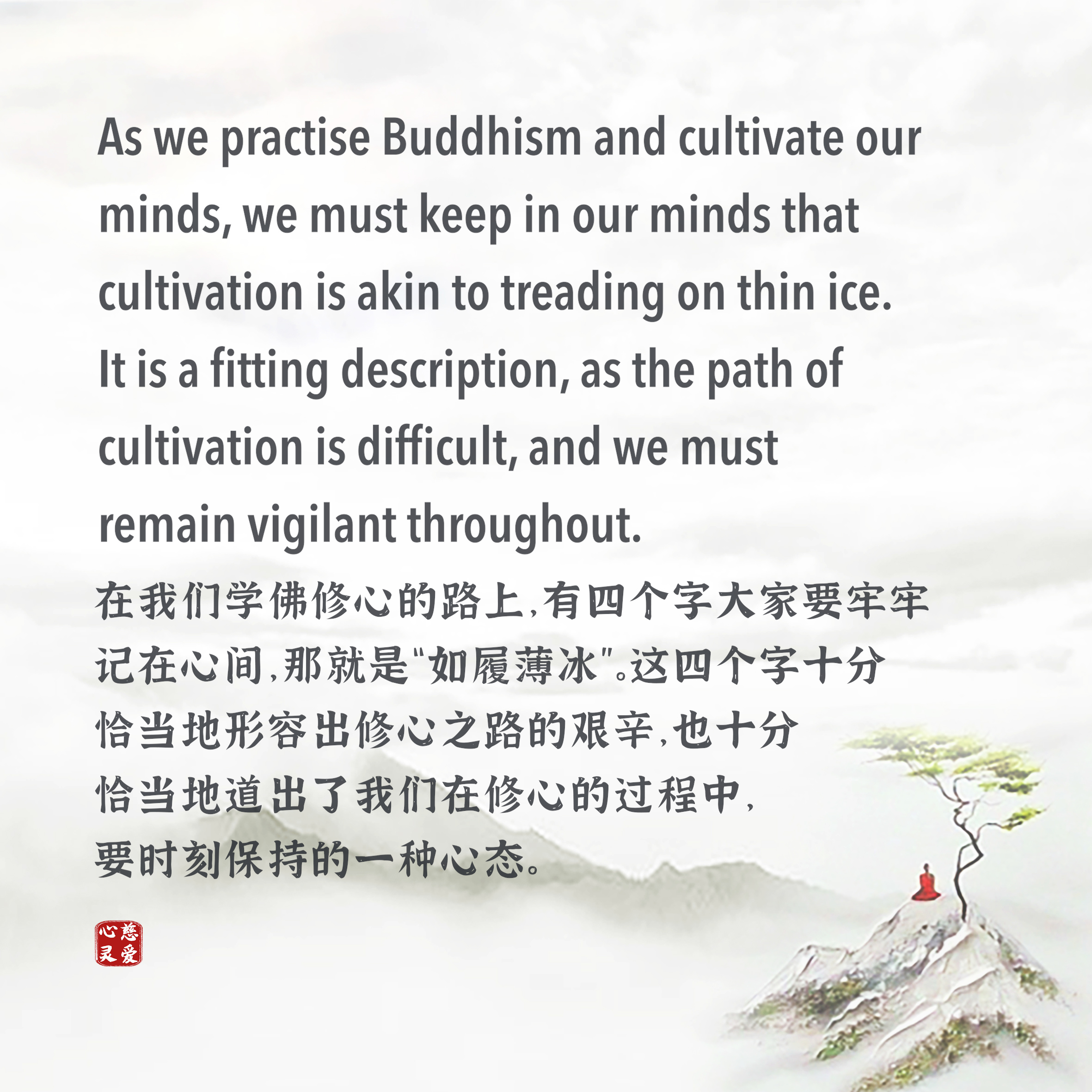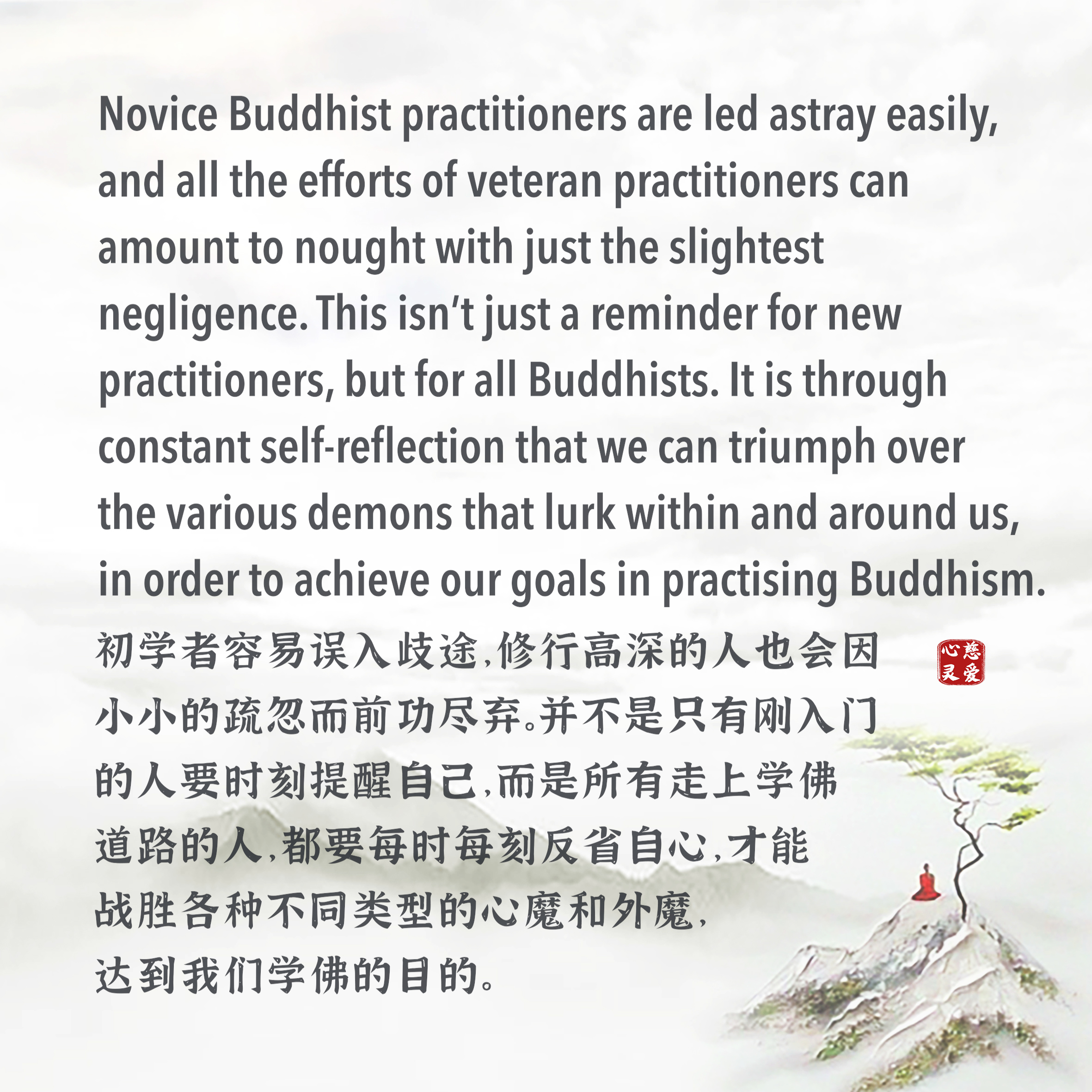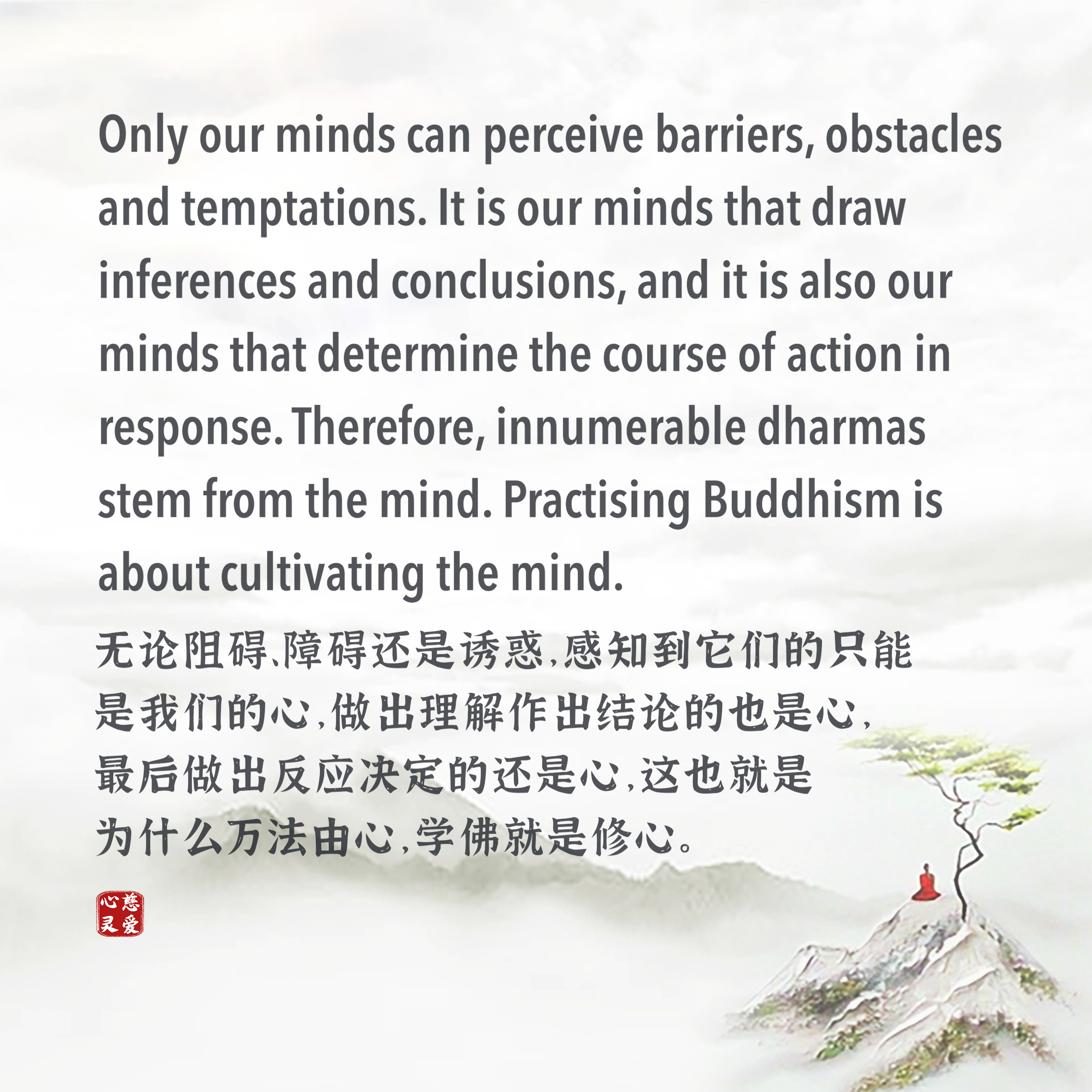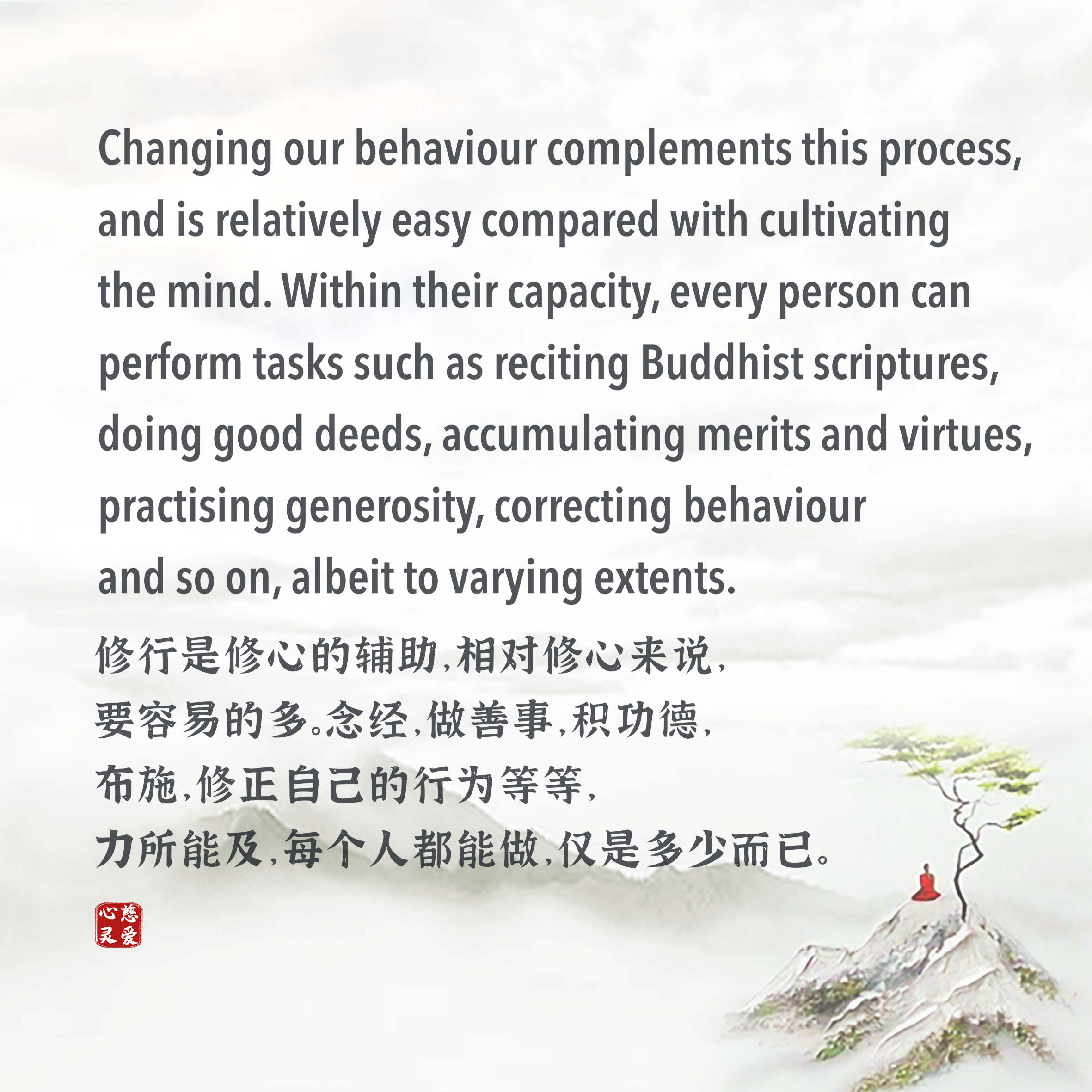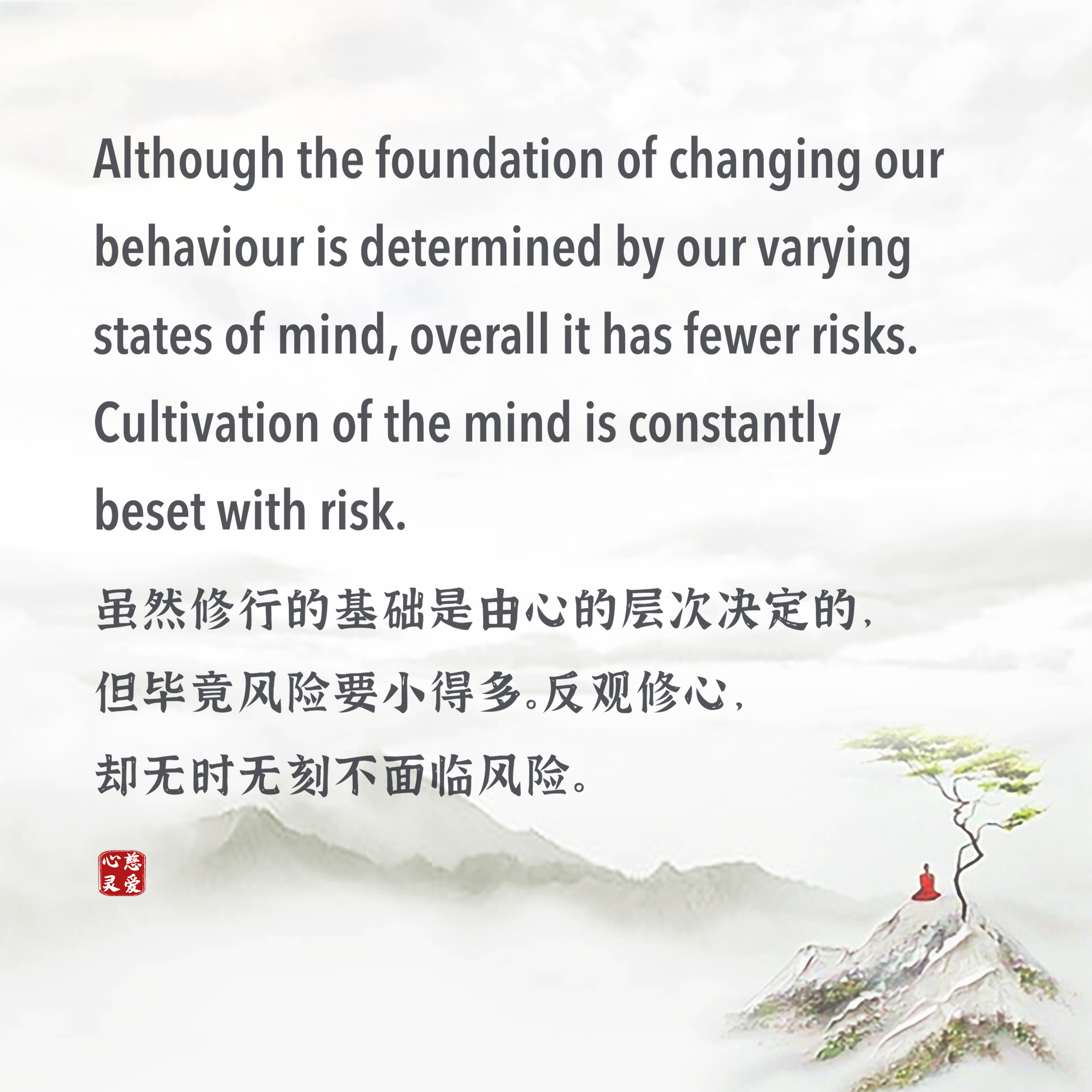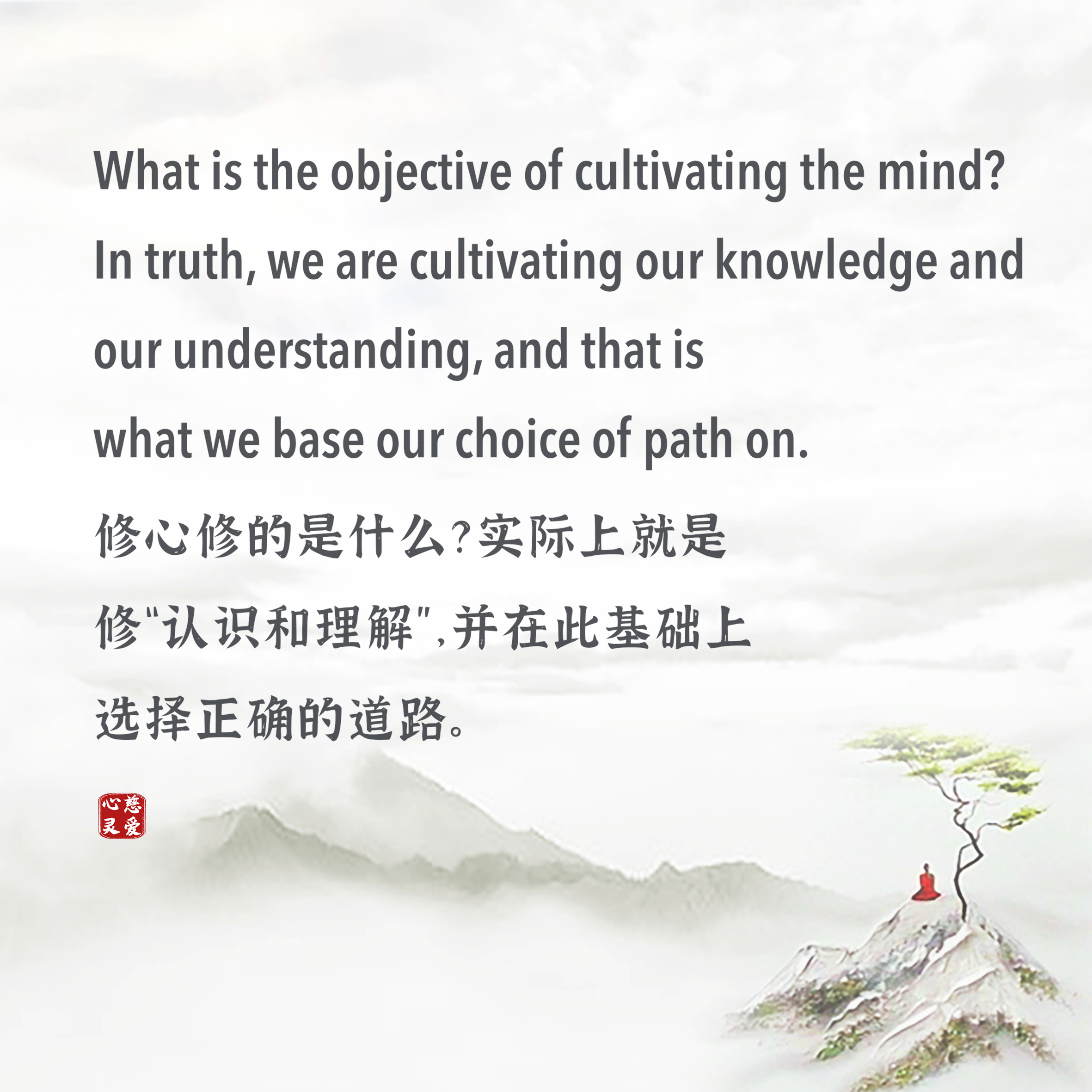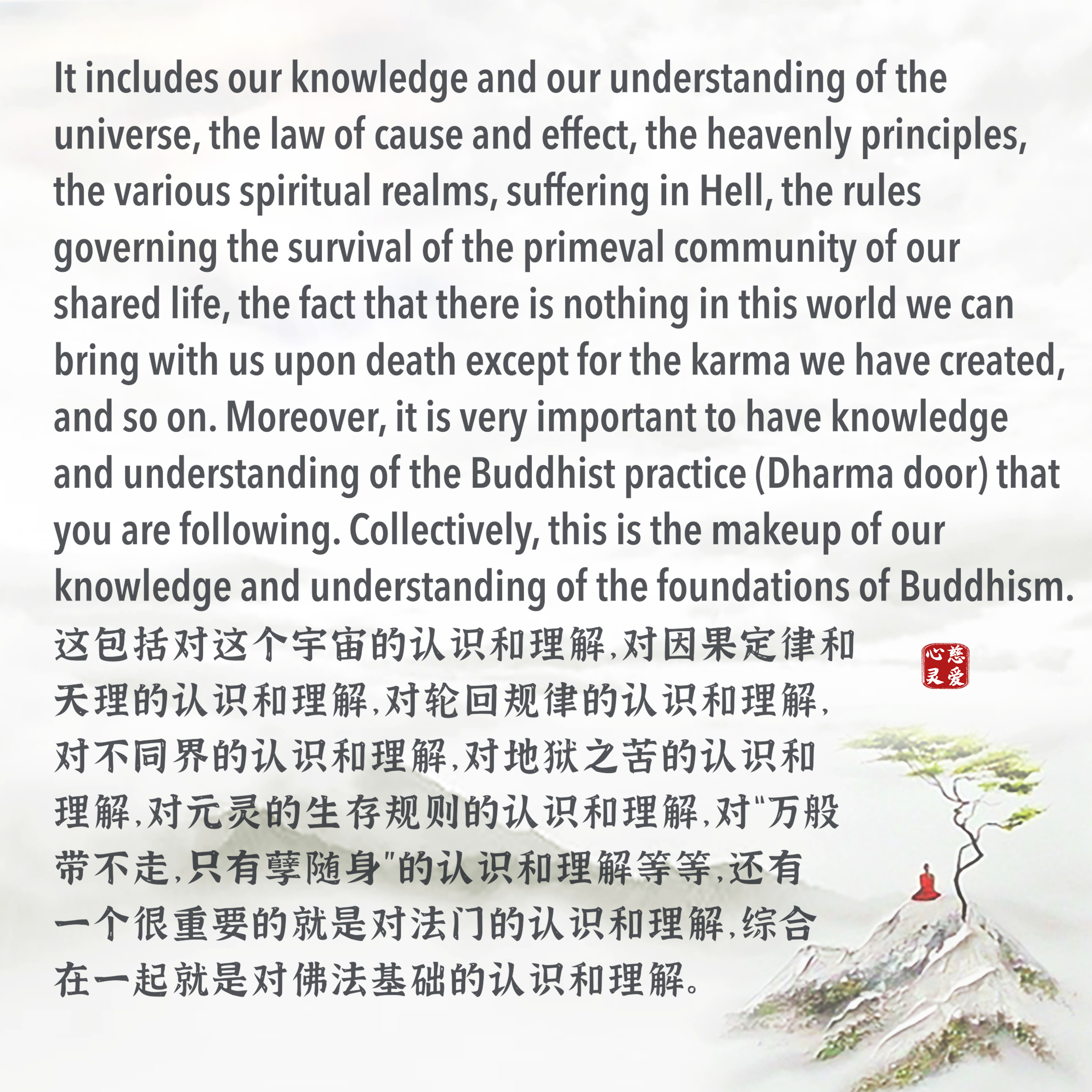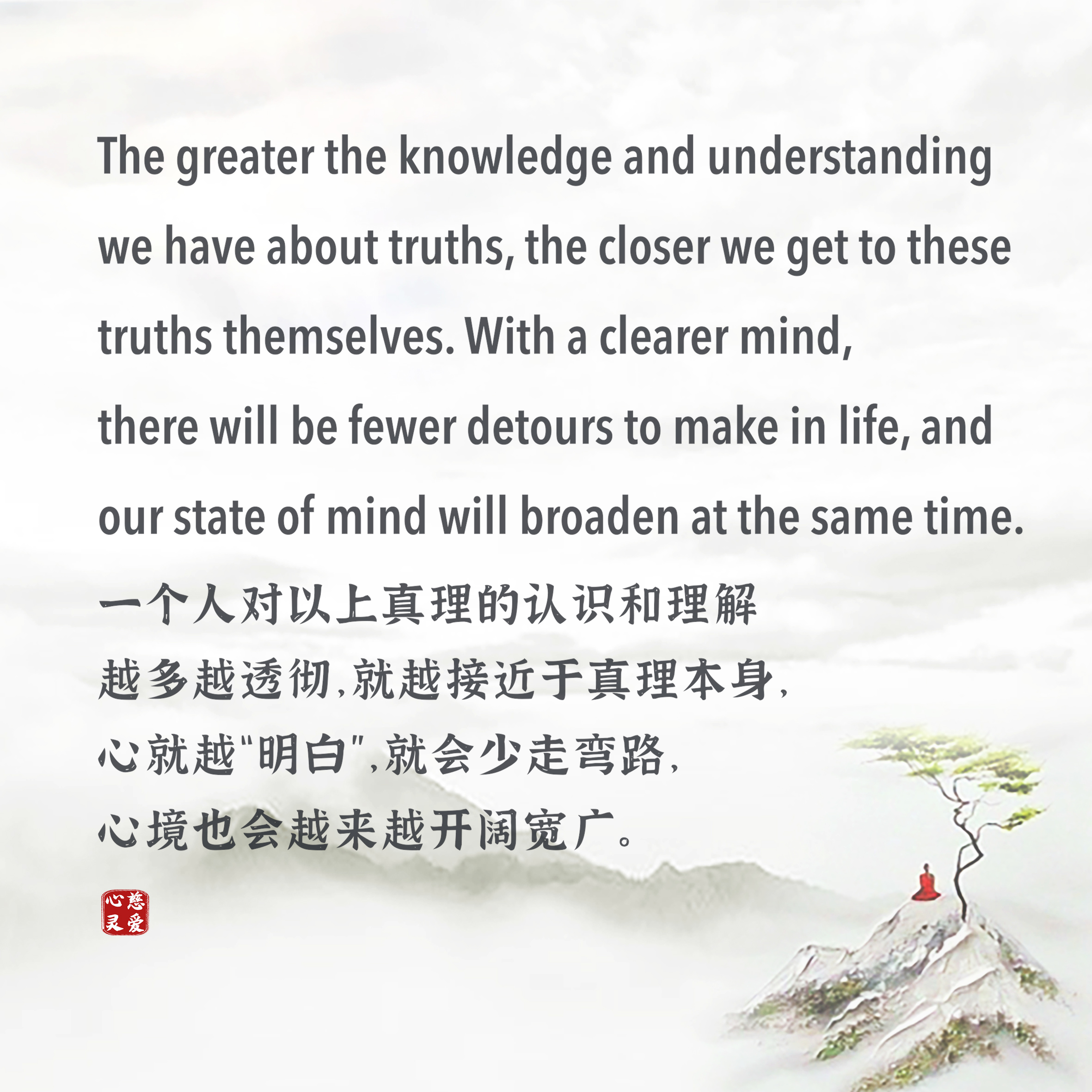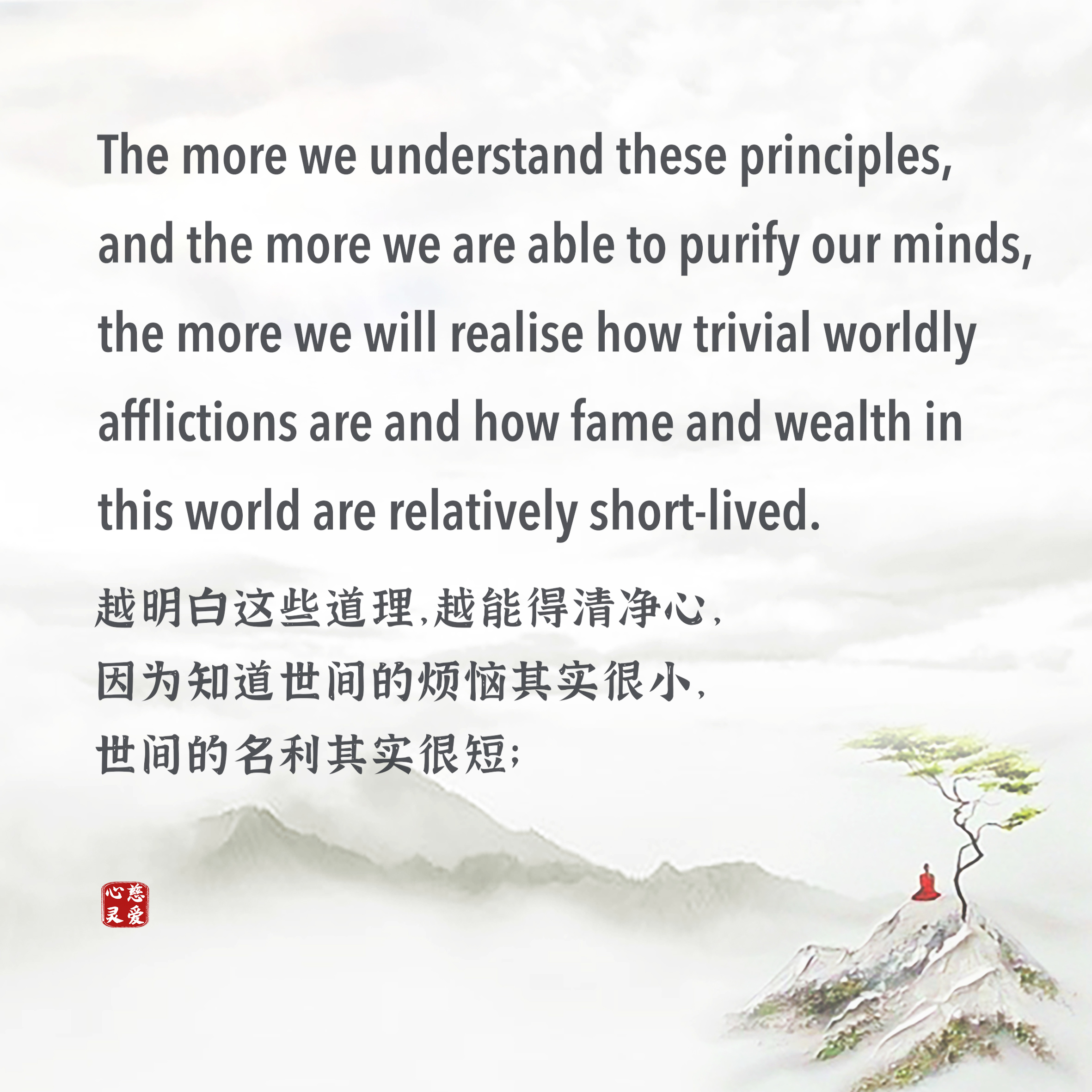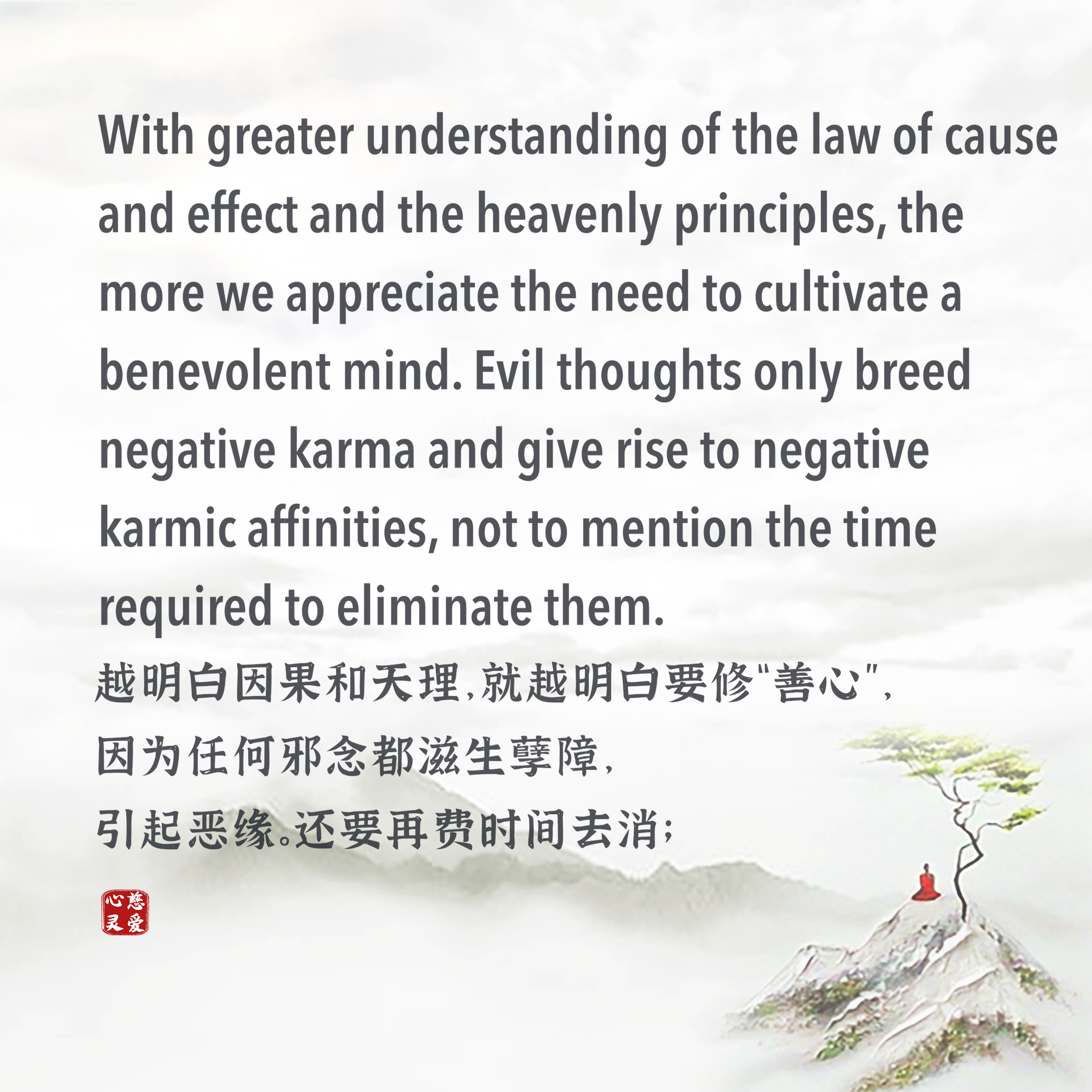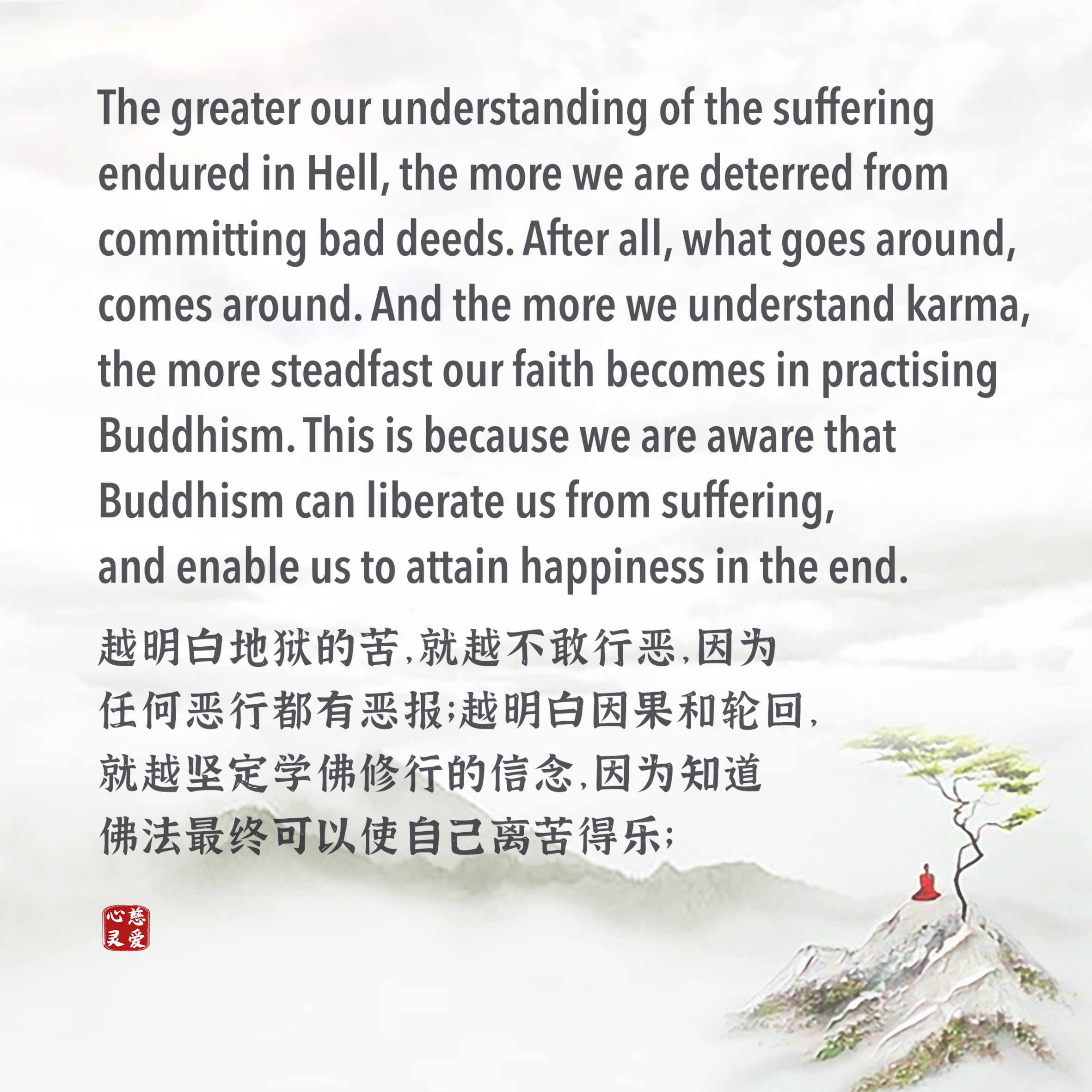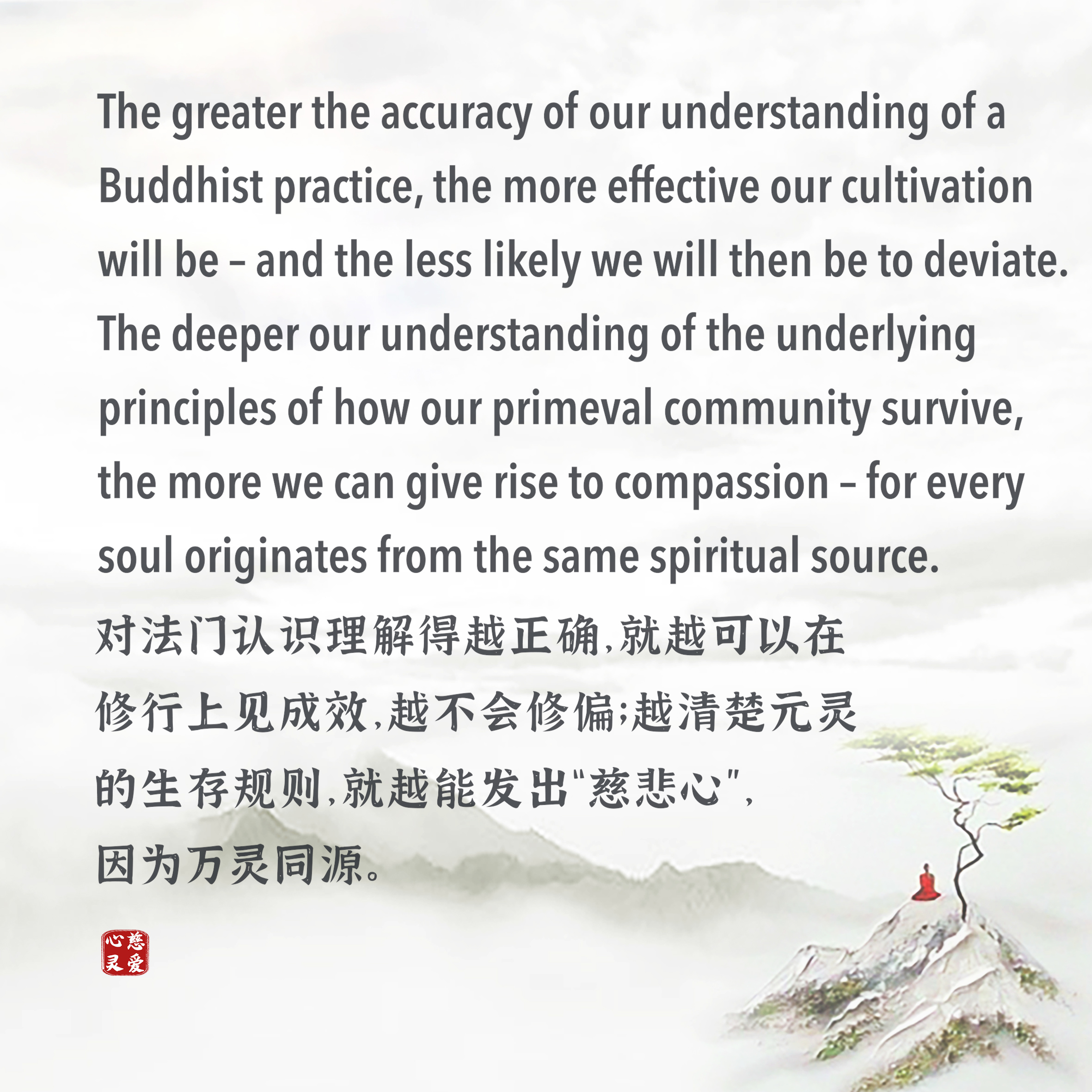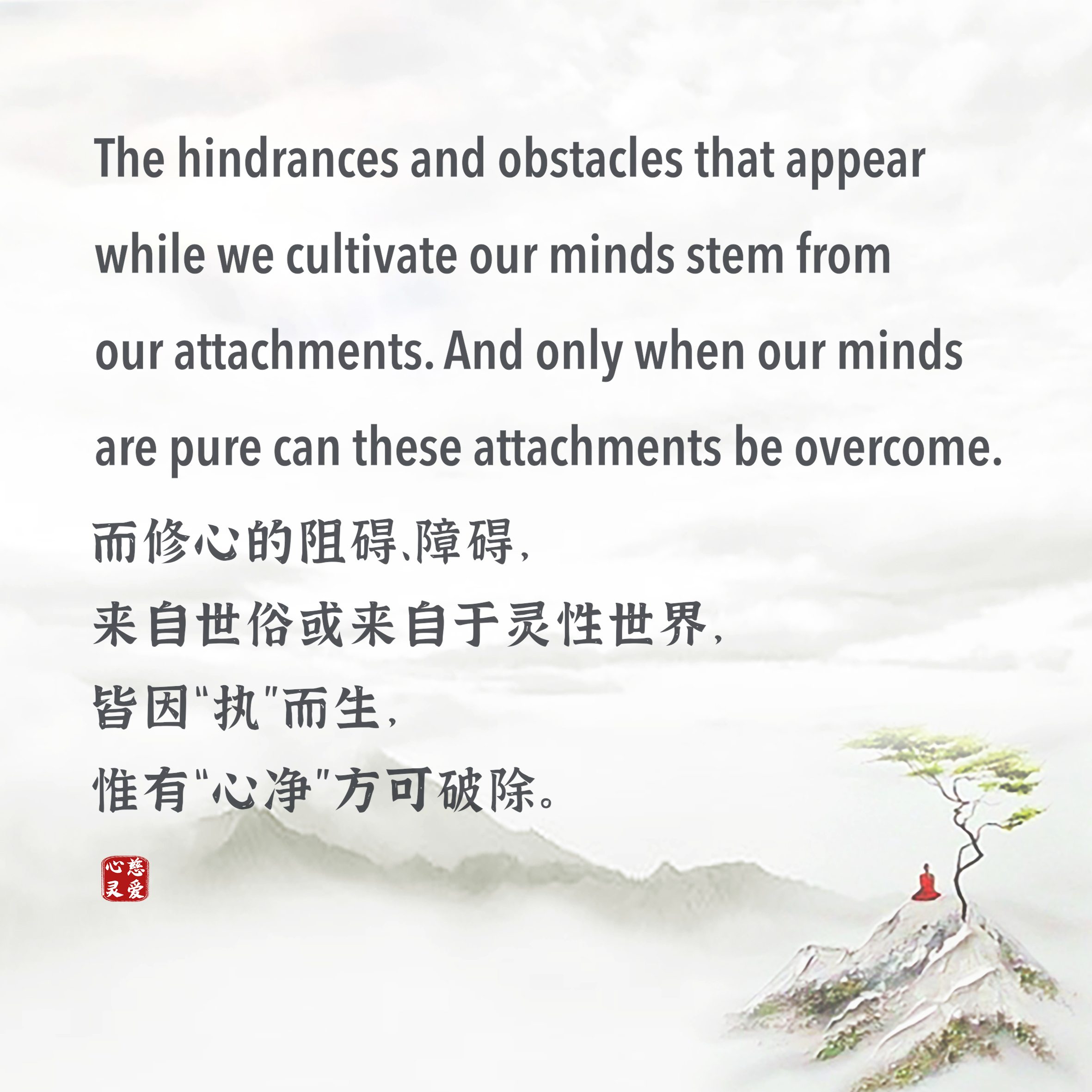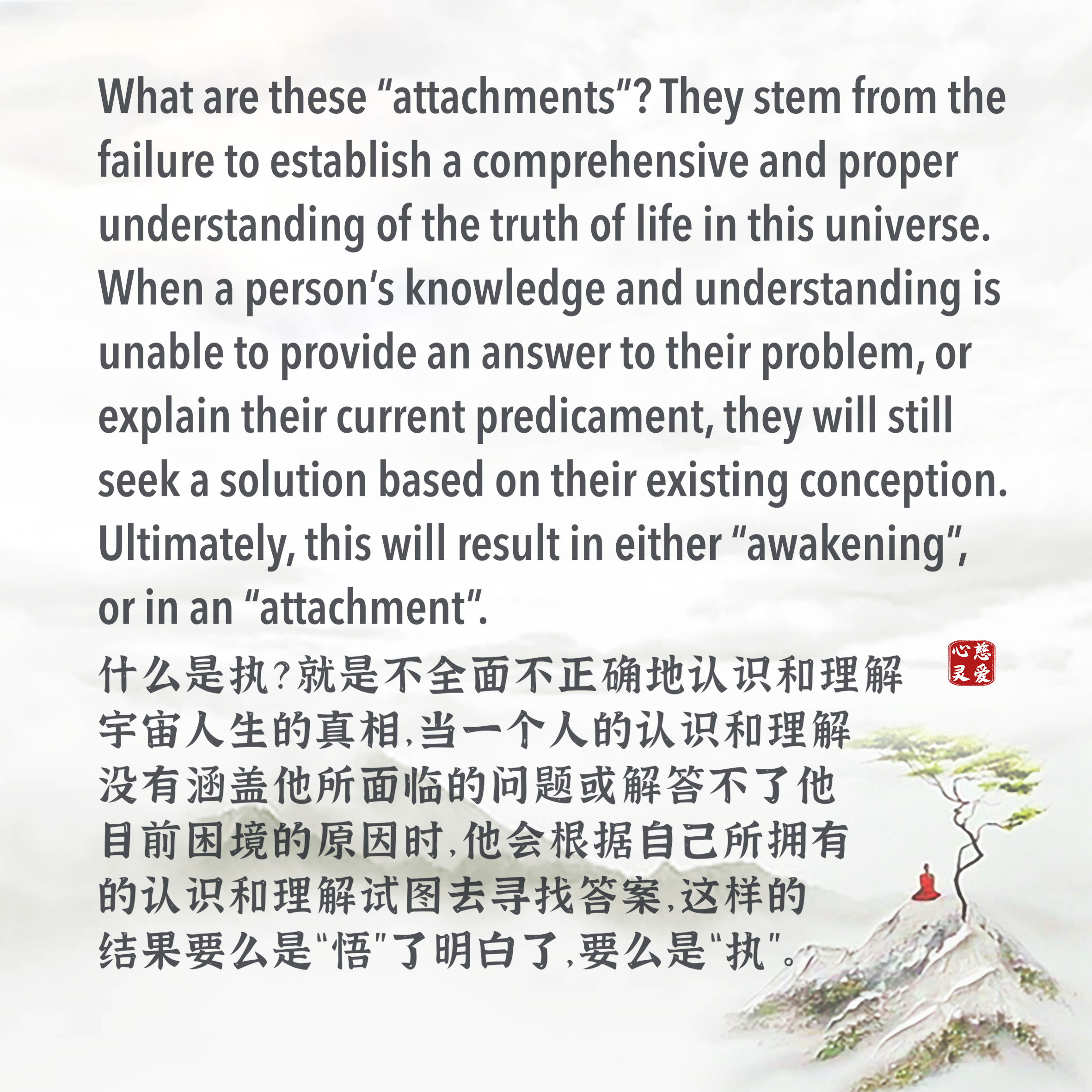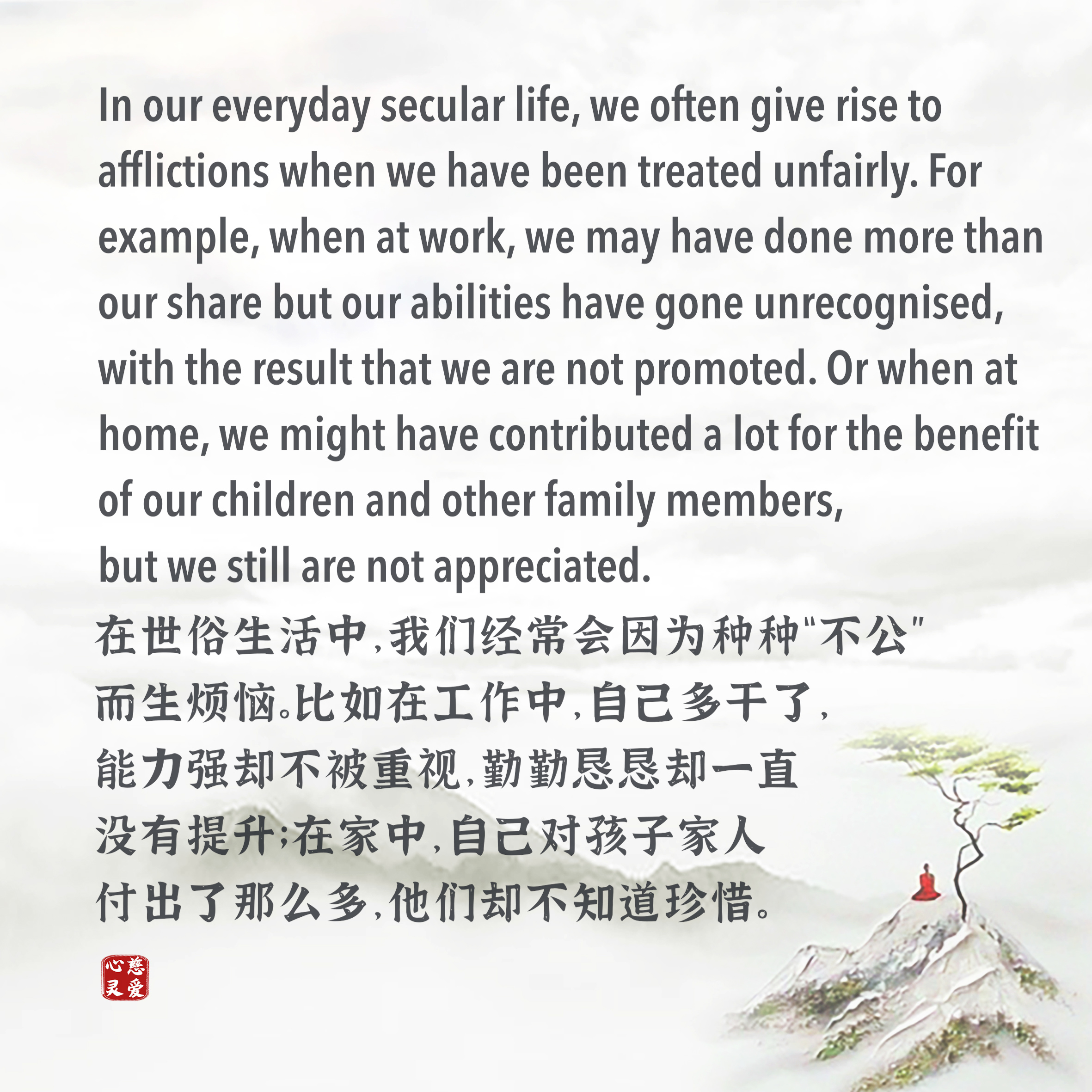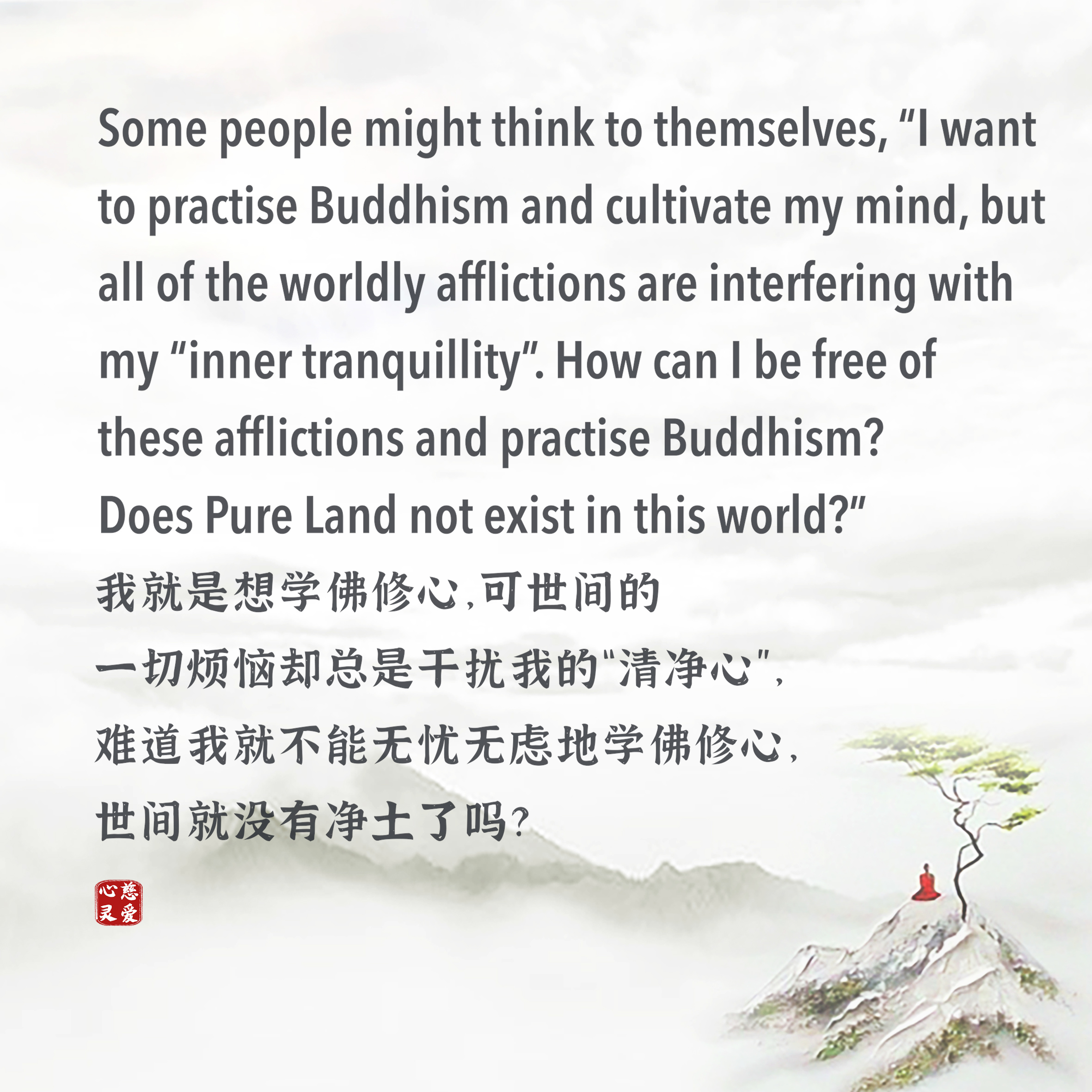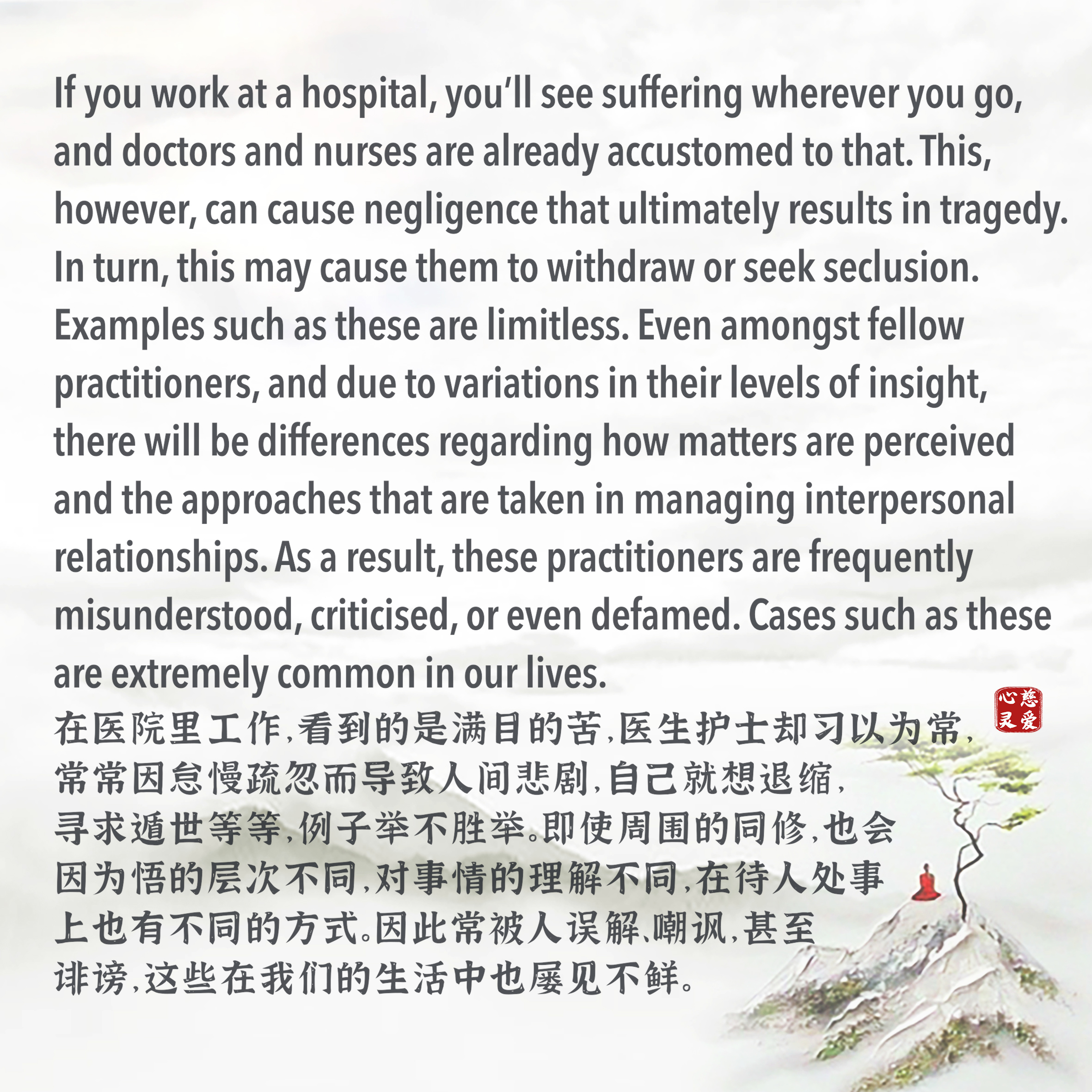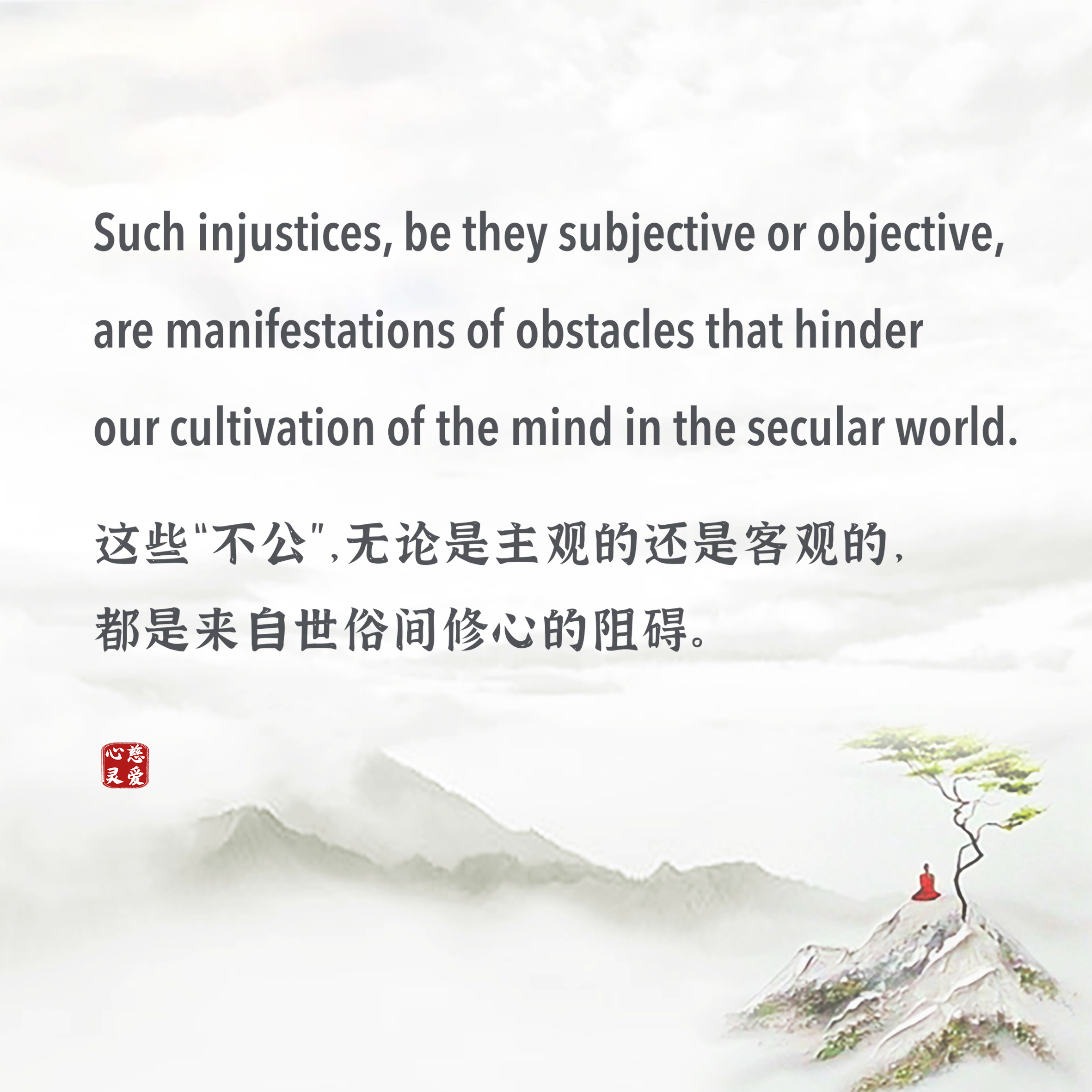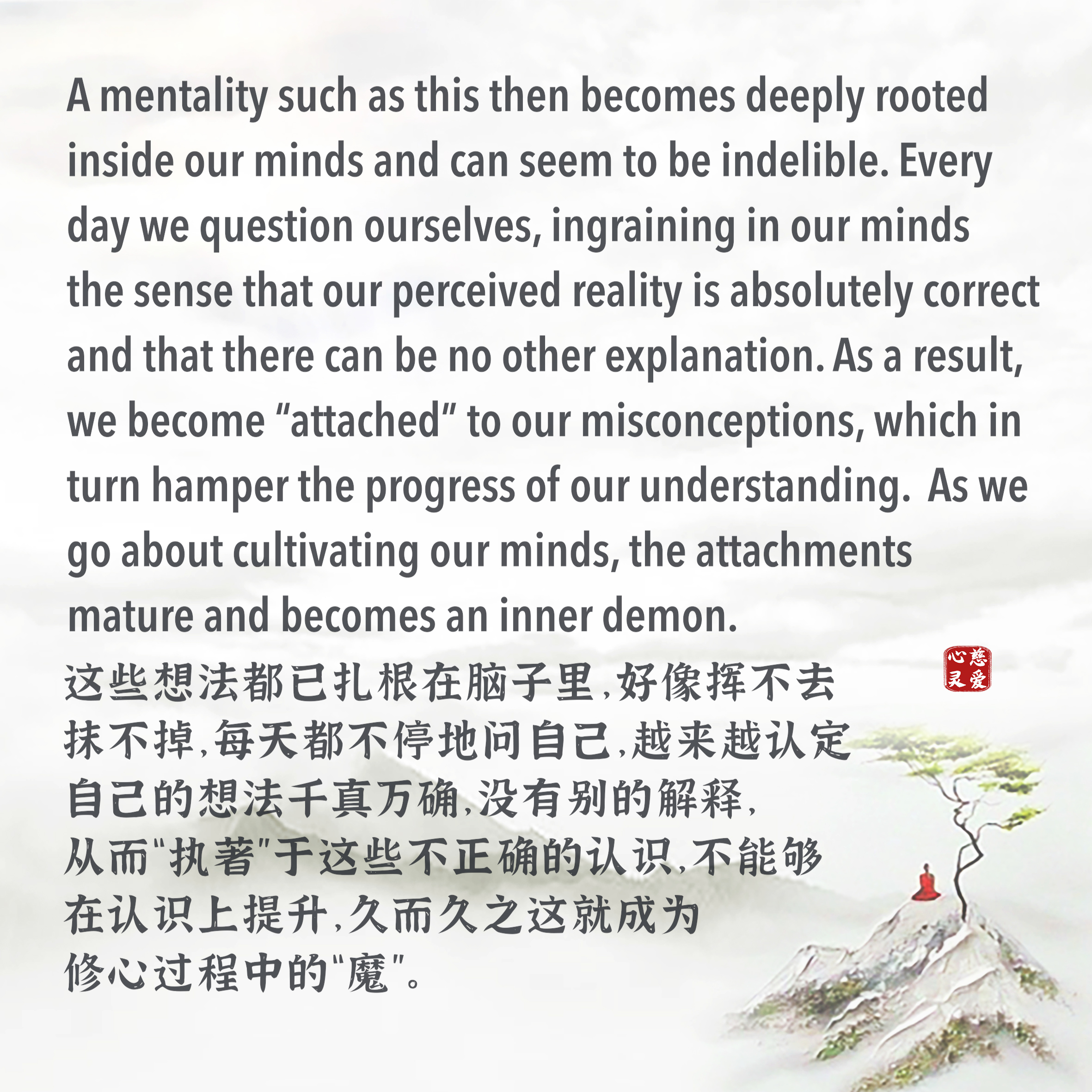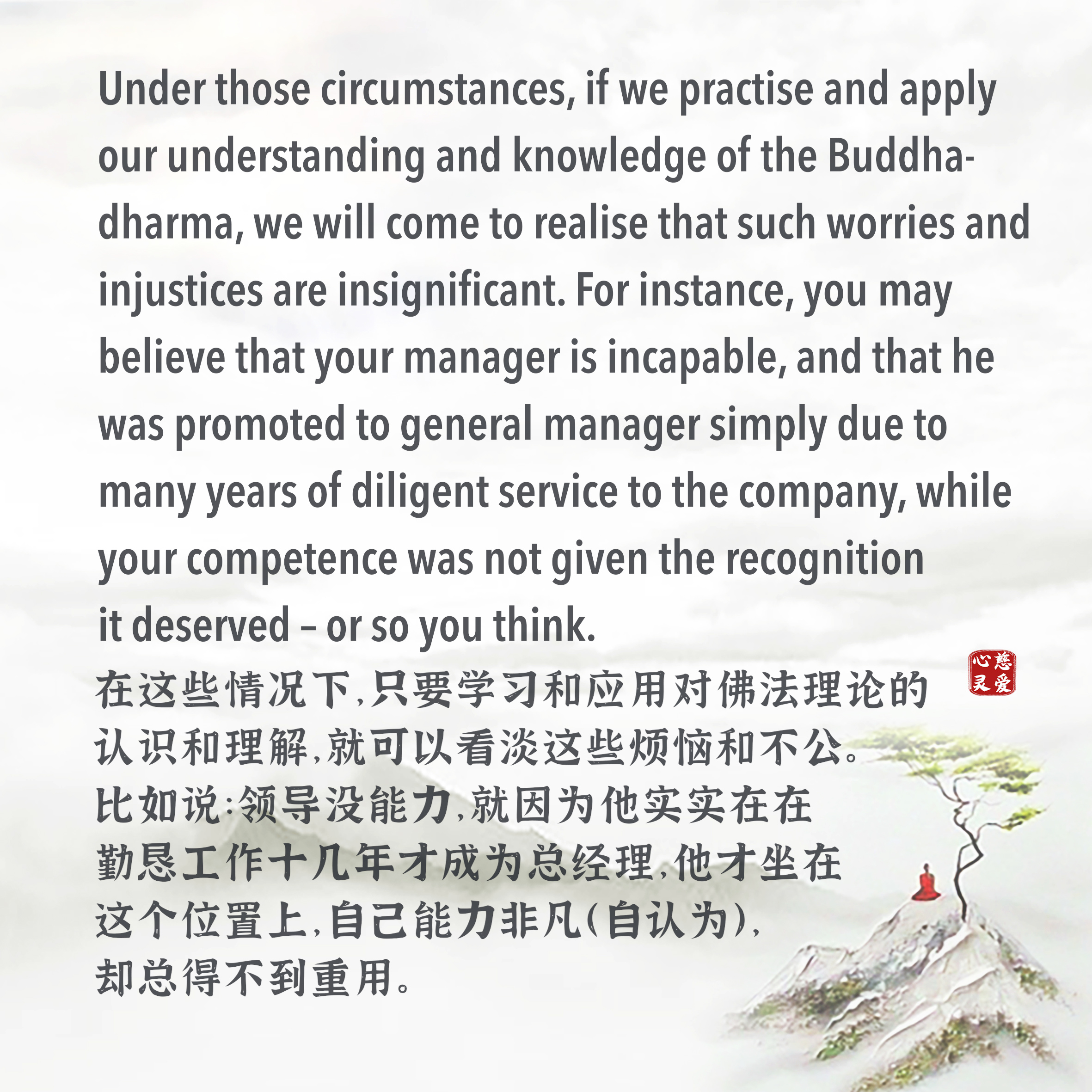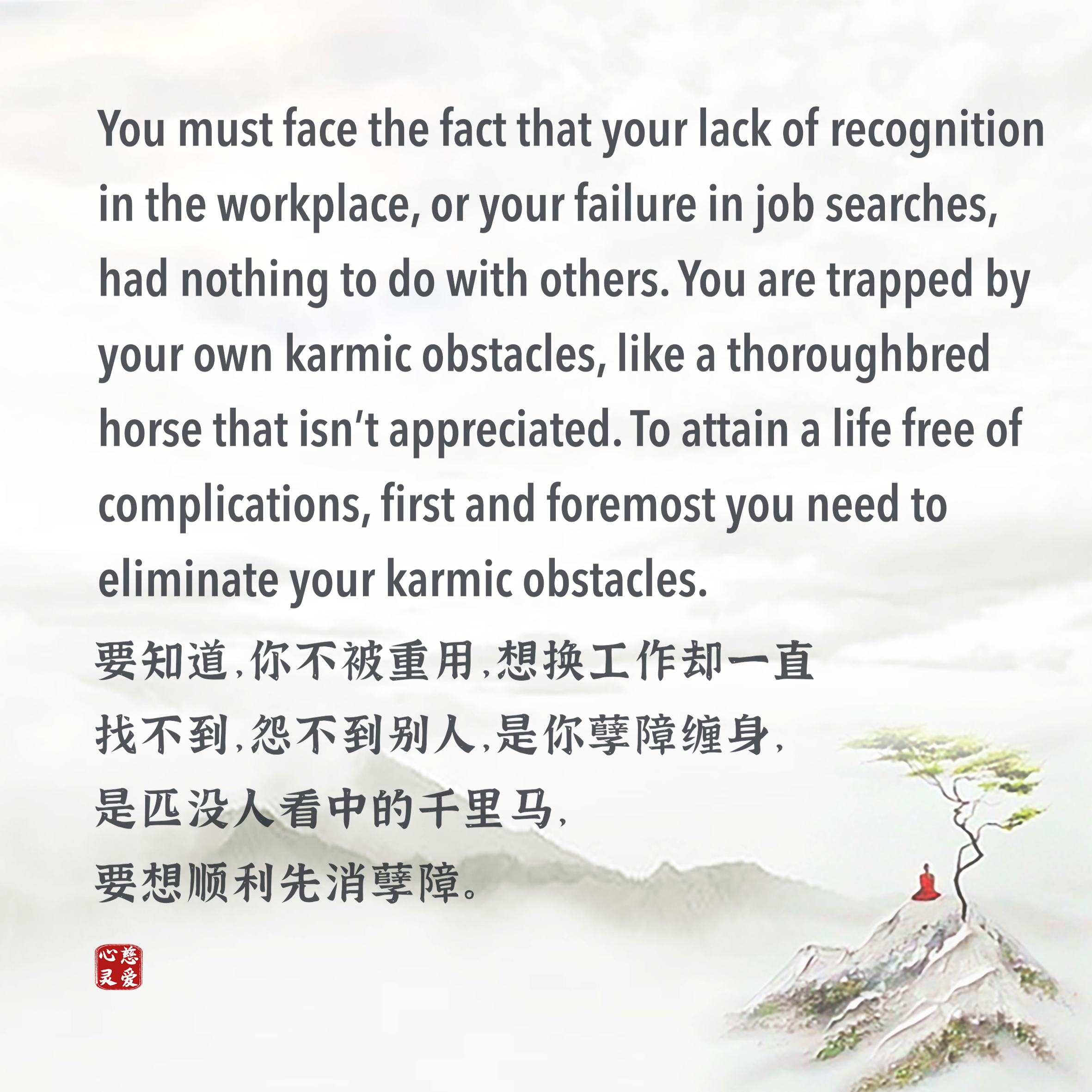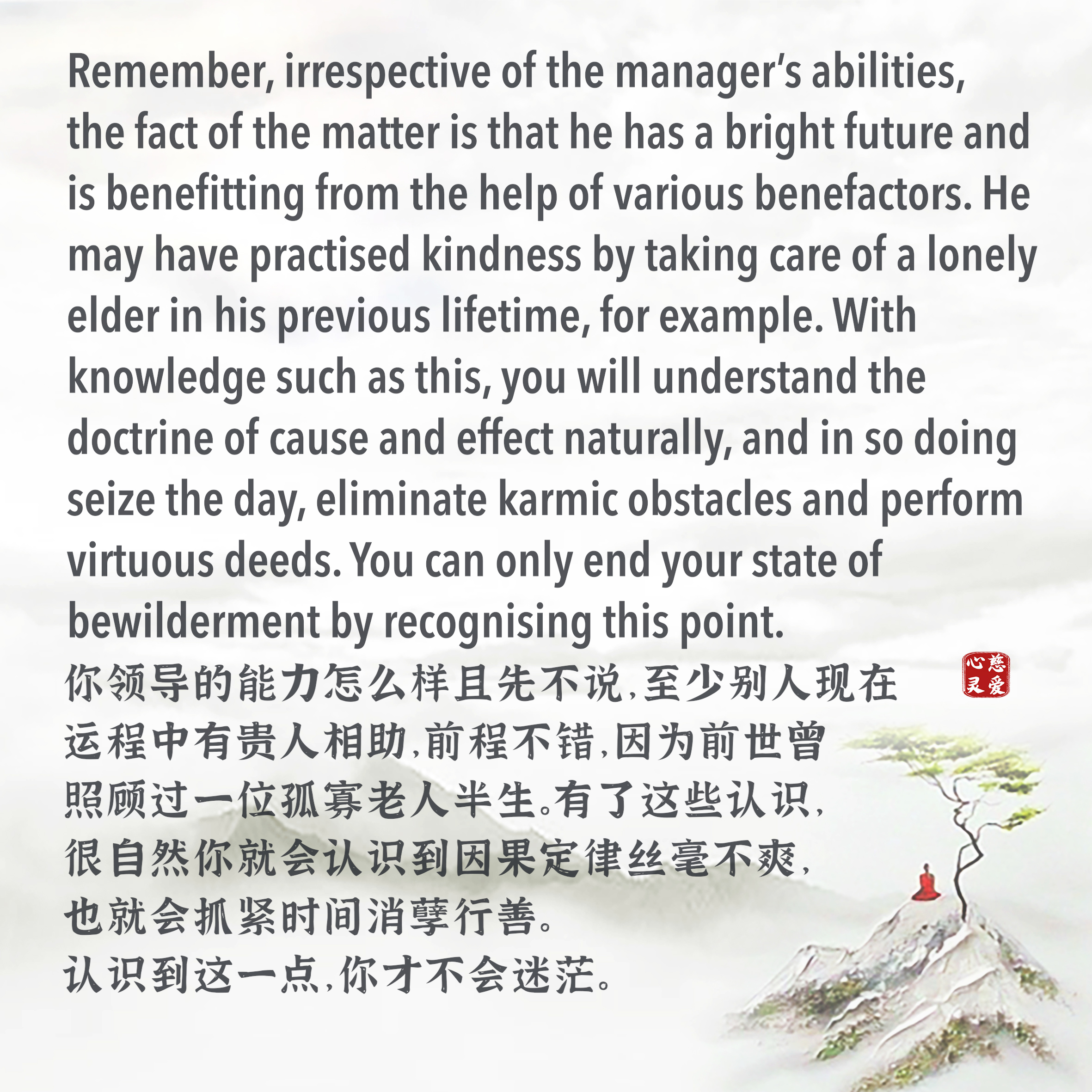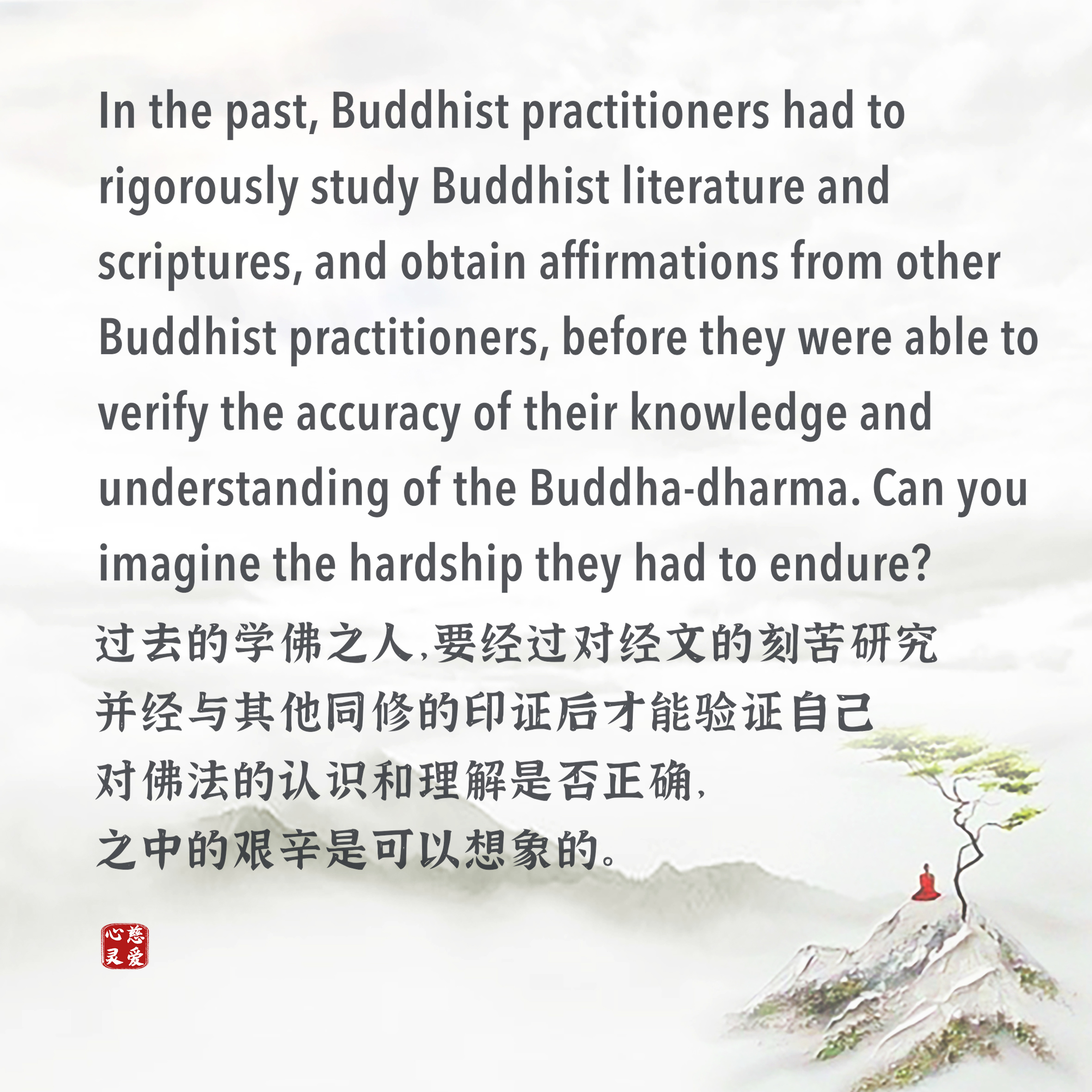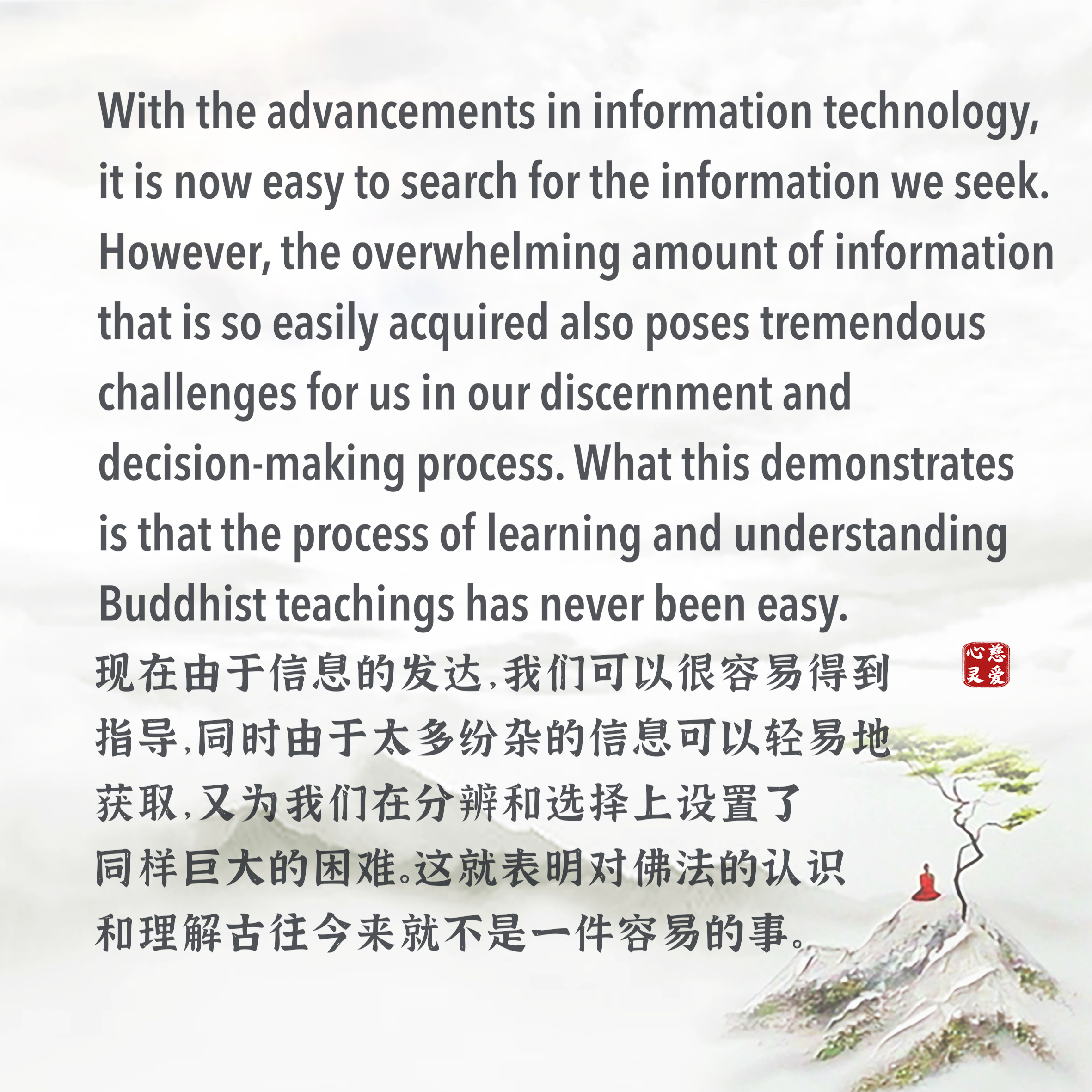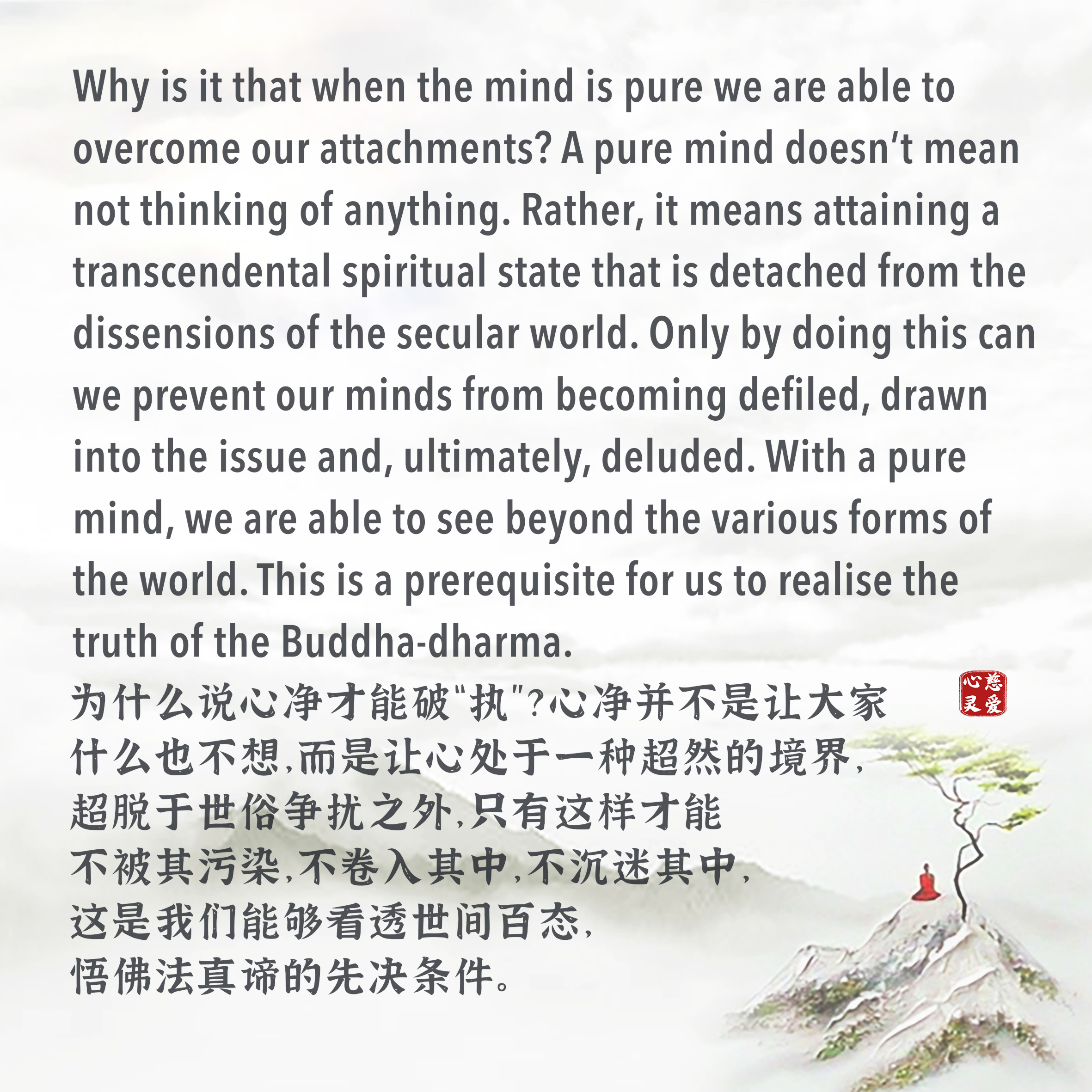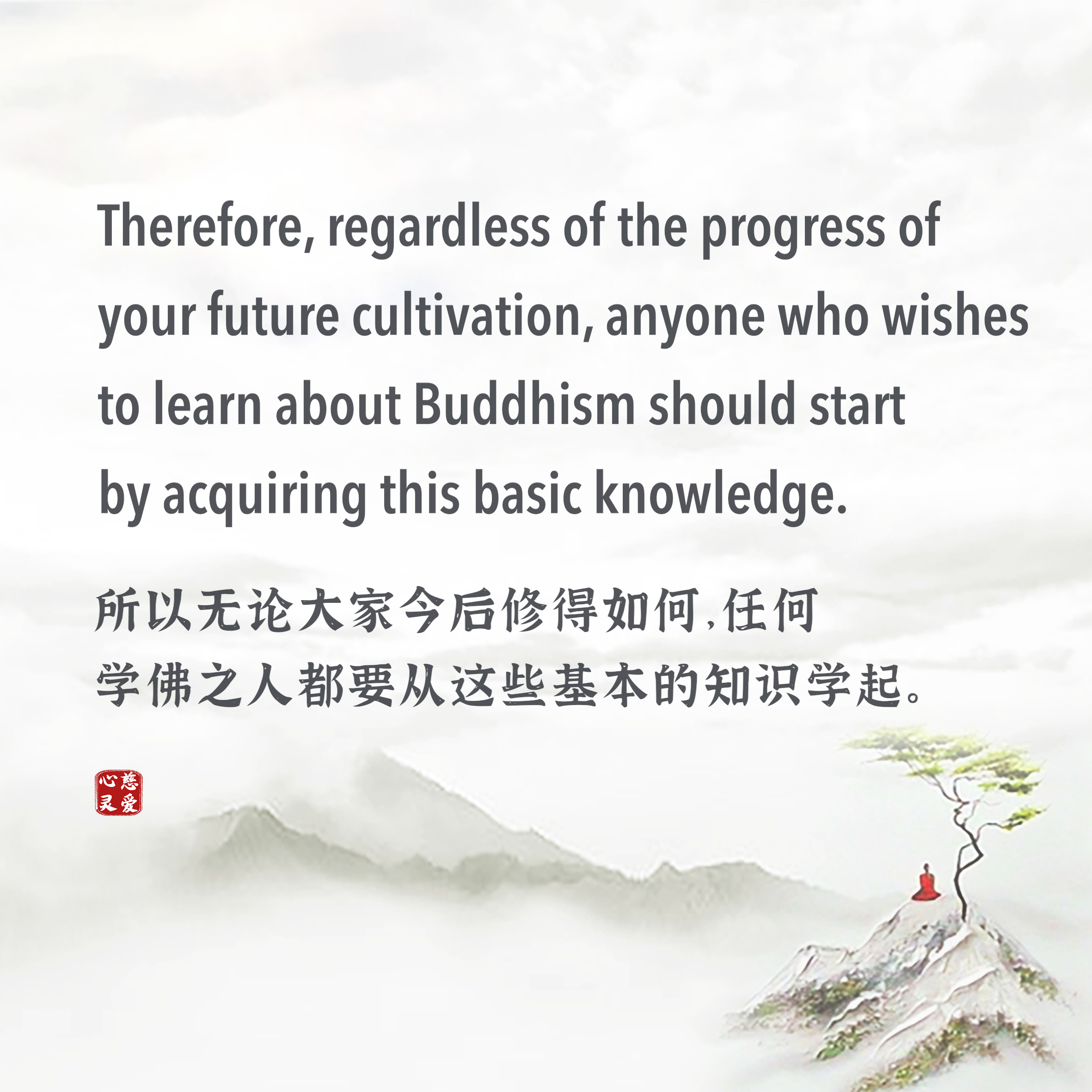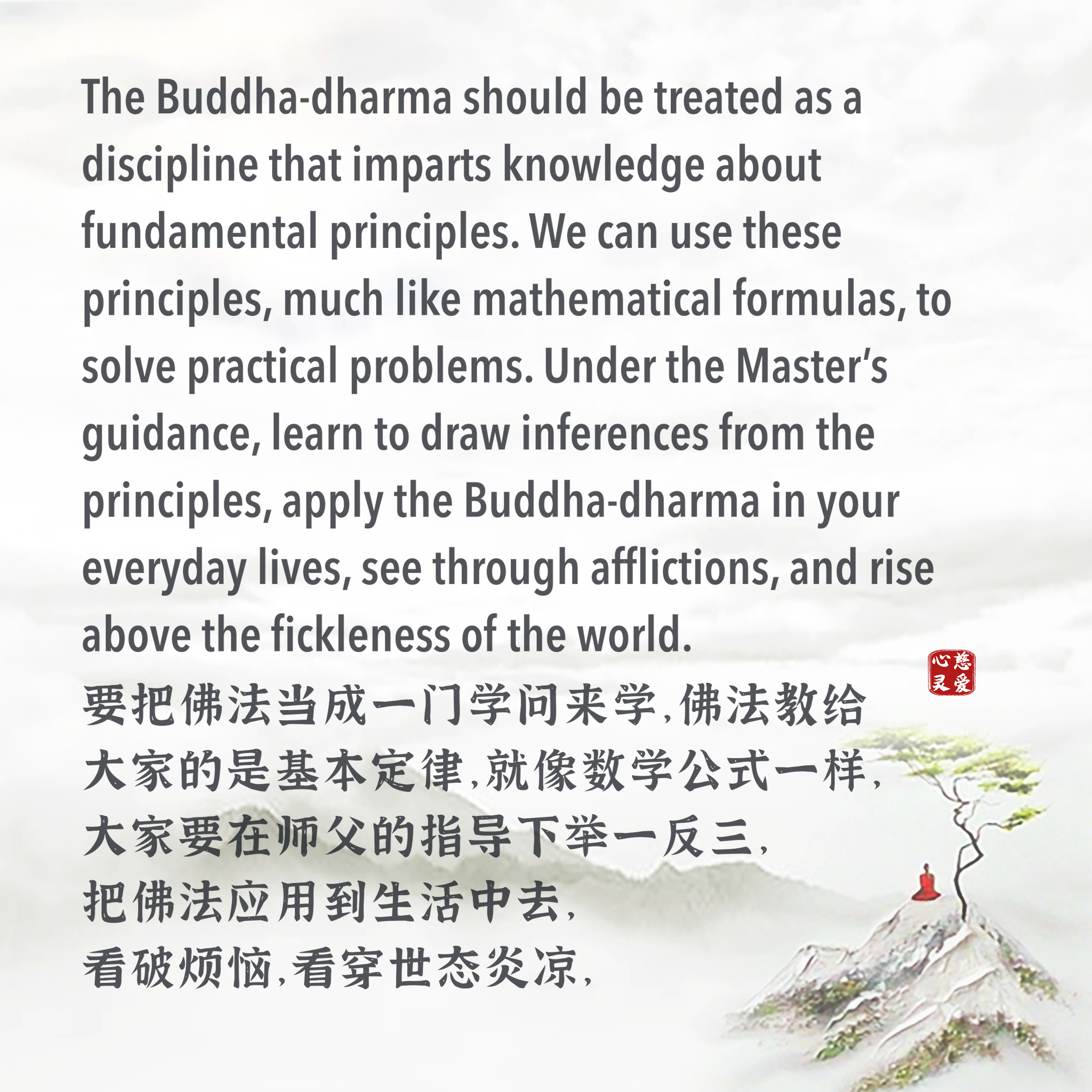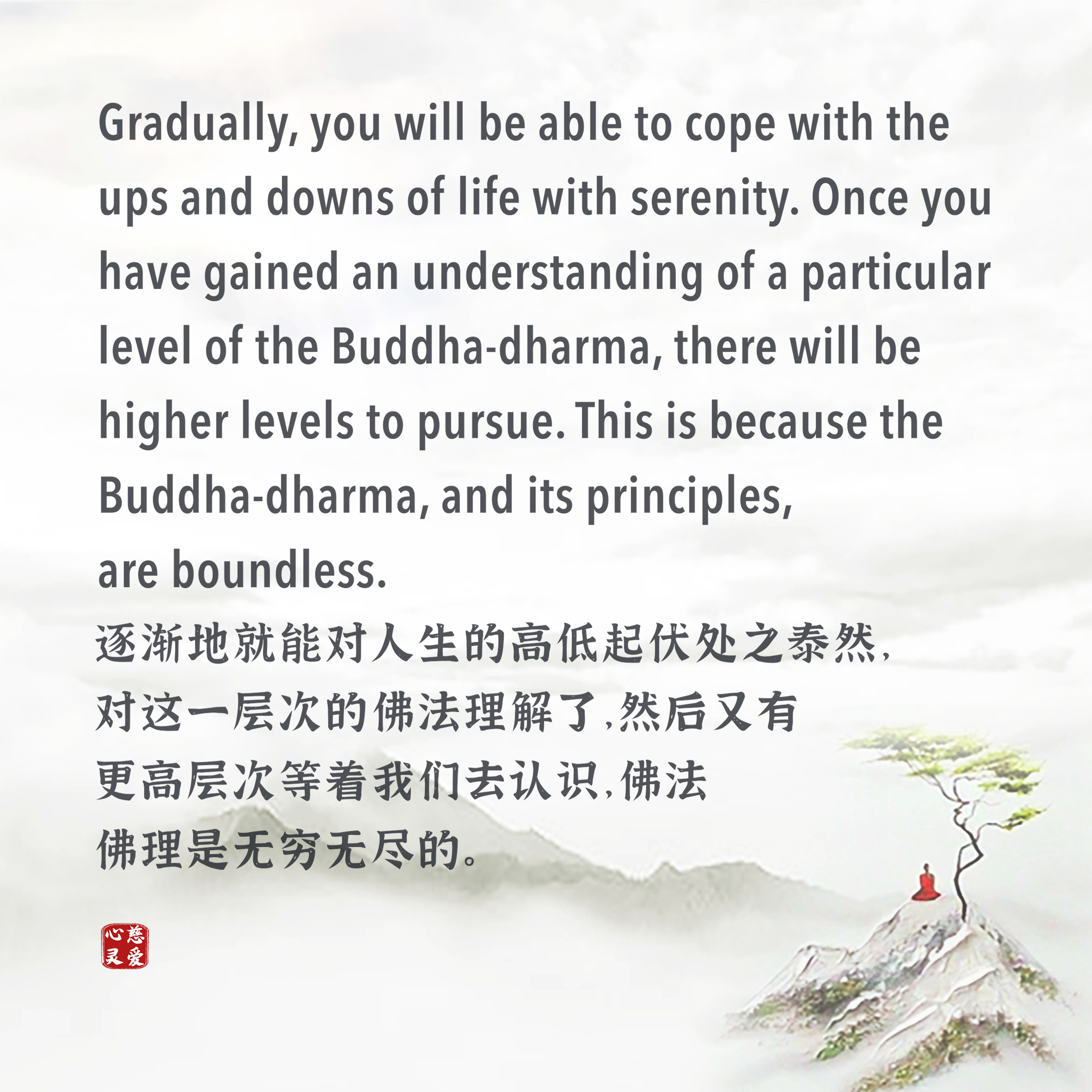As we practise Buddhism and cultivate our minds, we must keep in our minds that cultivation is akin to treading on thin ice. It is a fitting description, as the path of cultivation is difficult, and we must remain vigilant throughout. Novice Buddhist practitioners are led astray easily, and all the efforts of veteran practitioners can amount to nought with just the slightest negligence. This isn’t just a reminder for new practitioners, but for all Buddhists. It is through constant self-reflection that we can triumph over the various demons that lurk within and around us, in order to achieve our goals in practising Buddhism.
在我们学佛修心的路上,有四个字大家要牢牢记在心间,那就是“如履薄冰”。这四个字十分恰当地形容出修心之路的艰辛,也十分恰当地道出了我们在修心的过程中,要时刻保持的一种心态。初学者容易误入歧途,修行高深的人也会因小小的疏忽而前功尽弃。并不是只有刚入门的人要时刻提醒自己,而是所有走上学佛道路的人,都要每时每刻反省自心,才能战胜各种不同类型的心魔和外魔,达到我们学佛的目的。
Only our minds can perceive barriers, obstacles and temptations. It is our minds that draw inferences and conclusions, and it is also our minds that determine the course of action in response. Therefore, innumerable dharmas stem from the mind.
Practising Buddhism is about cultivating the mind. Changing our behaviour complements this process, and is relatively easy compared with cultivating the mind. Within their capacity, every person can perform tasks such as reciting Buddhist scriptures, doing good deeds, accumulating merits and virtues, practising generosity, correcting behaviour and so on, albeit to varying extents. Although the foundation of changing our behaviour is determined by our varying states of mind, overall it has fewer risks. Cultivation of the mind is constantly beset with risk.
无论阻碍、障碍还是诱惑,感知到它们的只能是我们的心,做出理解作出结论的也是心,最后做出反应决定的还是心,这也就是为什么万法由心,学佛就是修心。修行是修心的辅助,相对修心来说,要容易的多。念经,做善事,积功德,布施,修正自己的行为等等,力所能及,每个人都能做,仅是多少而已。虽然修行的基础是由心的层次决定的,但毕竟风险要小得多。反观修心,却无时无刻不面临风险
What is the objective of cultivating the mind? In truth, we are cultivating our knowledge and our understanding, and that is what we base our choice of path on. It includes our knowledge and our understanding of the universe, the law of cause and effect, the heavenly principles, the various spiritual realms, suffering in Hell, the rules governing the survival of the primeval community of our shared life, the fact that there is nothing in this world we can bring with us upon death except for the karma we have created, and so on. Moreover, it is very important to have knowledge and understanding of the Buddhist practice (Dharma door) that you are following. Collectively, this is the makeup of our knowledge and understanding of the foundations of Buddhism.
修心修的是什么?实际上就是修“认识和理解”,并在此基础上选择正确的道路。这包括对这个宇宙的认识和理解,对因果定律和天理的认识和理解,对轮回规律的认识和理解,对不同界的认识和理解,对地狱之苦的认识和理解,对元灵的生存规则的认识和理解,对“万般带不走,只有孽随身”的认识和理解等等,还有一个很重要的就是对法门的认识和理解,综合在一起就是对佛法基础的认识和理解。
The greater the knowledge and understanding we have about truths, the closer we get to these truths themselves. With a clearer mind, there will be fewer detours to make in life, and our state of mind will broaden at the same time.
The more we understand these principles, and the more we are able to purify our minds, the more we will realise how trivial worldly afflictions are and how fame and wealth in this world are relatively short-lived. With greater understanding of the law of cause and effect and the heavenly principles, the more we appreciate the need to cultivate a benevolent mind. Evil thoughts only breed negative karma and give rise to negative karmic affinities, not to mention the time required to eliminate them. The greater our understanding of the suffering endured in Hell, the more we are deterred from committing bad deeds. After all, what goes around, comes around. And the more we understand karma, the more steadfast our faith becomes in practising Buddhism. This is because we are aware that Buddhism can liberate us from suffering, and enable us to attain happiness in the end. The greater the accuracy of our understanding of a Buddhist practice, the more effective our cultivation will be – and the less likely we will then be to deviate. The deeper our understanding of the underlying principles of how our primeval community survive, the more we can give rise to compassion – for every soul originates from the same spiritual source.
一个人对以上真理的认识和理解越多越透彻,就越接近于真理本身,心就越“明白”,就会少走弯路,心境也会越来越开阔宽广。越明白这些道理,越能得清净心,因为知道世间的烦恼其实很小,世间的名利其实很短;越明白因果和天理,就越明白要修“善心”,因为任何邪念都滋生孽障,引起恶缘。还要再费时间去消;越明白地狱的苦,就越不敢行恶,因为任何恶行都有恶报;越明白因果和轮回,就越坚定学佛修行的信念,因为知道佛法最终可以使自己离苦得乐;对法门认识理解得越正确,就越可以在修行上见成效,越不会修偏;越清楚元灵的生存规则,就越能发出“慈悲心”,因为万灵同源。
The hindrances and obstacles that appear while we cultivate our minds stem from our attachments. And only when our minds are pure can these attachments be overcome. What are these “attachments”? They stem from the failure to establish a comprehensive and proper understanding of the truth of life in this universe. When a person’s knowledge and understanding is unable to provide an answer to their problem, or explain their current predicament, they will still seek a solution based on their existing conception. Ultimately, this will result in either “awakening”, or in an “attachment”.
而修心的阻碍、障碍,来自世俗或来自于灵性世界,皆因“执”而生,惟有“心净”方可破除。什么是执?就是不全面不正确地认识和理解宇宙人生的真相,当一个人的认识和理解没有涵盖他所面临的问题或解答不了他目前困境的原因时,他会根据自己所拥有的认识和理解试图去寻找答案,这样的结果要么是“悟”了明白了,要么是“执”。
In our everyday secular life, we often give rise to afflictions when we have been treated unfairly. For example, when at work, we may have done more than our share but our abilities have gone unrecognised, with the result that we are not promoted. Or when at home, we might have contributed a lot for the benefit of our children and other family members, but we still are not appreciated. Some people might think to themselves, “I want to practise Buddhism and cultivate my mind, but all of the worldly afflictions are interfering with my “inner tranquillity”. How can I be free of these afflictions and practise Buddhism? Does Pure Land not exist in this world?” If you work at a hospital, you’ll see suffering wherever you go, and doctors and nurses are already accustomed to that. This, however, can cause negligence that ultimately results in tragedy. In turn, this may cause them to withdraw or seek seclusion. Examples such as these are limitless. Even amongst fellow practitioners, and due to variations in their levels of insight, there will be differences regarding how matters are perceived and the approaches that are taken in managing interpersonal relationships. As a result, these practitioners are frequently misunderstood, criticised, or even defamed. Cases such as these are extremely common in our lives. Such injustices, be they subjective or objective, are manifestations of obstacles that hinder our cultivation of the mind in the secular world. A mentality such as this then becomes deeply rooted inside our minds and can seem to be indelible. Every day we question ourselves, ingraining in our minds the sense that our perceived reality is absolutely correct and that there can be no other explanation. As a result, we become “attached” to our misconceptions, which in turn hamper the progress of our understanding. As we go about cultivating our minds, the attachments mature and becomes an inner demon.
在世俗生活中,我们经常会因为种种“不公”而生烦恼。比如在工作中,自己多干了,能力强却不被重视,勤勤恳恳却一直没有提升;在家中,自己对孩子家人付出了那么多,他们却不知道珍惜。我就是想学佛修心,可世间的一切烦恼却总是干扰我的“清净心”,难道我就不能无忧无虑地学佛修心,世间就没有净土了吗?在医院里工作,看到的是满目的苦,医生护士却习以为常,常常因怠慢疏忽而导致人间悲剧,自己就想退缩,寻求遁世等等,例子举不胜举。即使周围的同修,也会因为悟的层次不同,对事情的理解不同,在待人处事上也有不同的方式。因此常被人误解、嘲讽,甚至诽谤,这些在我们的生活中也屡见不鲜。这些“不公”,无论是主观的还是客观的,都是来自世俗间修心的阻碍。这些想法都已扎根在脑子里,好像挥不去抹不掉,每天都不停地问自己,越来越认定自己的想法千真万确,没有别的解释,从而“执著”于这些不正确的认识,不能够在认识上提升,久而久之这就成为修心过程中的“魔”。
Under those circumstances, if we practise and apply our understanding and knowledge of the Buddha-dharma, we will come to realise that such worries and injustices are insignificant. For instance, you may believe that your manager is incapable, and that he was promoted to general manager simply due to many years of diligent service to the company, while your competence was not given the recognition it deserved – or so you think. You must face the fact that your lack of recognition in the workplace, or your failure in job searches, had nothing to do with others. You are trapped by your own karmic obstacles, like a thoroughbred horse that isn’t appreciated. To attain a life free of complications, first and foremost you need to eliminate your karmic obstacles. Remember, irrespective of the manager’s abilities, the fact of the matter is that he has a bright future and is benefitting from the help of various benefactors. He may have practised kindness by taking care of a lonely elder in his previous lifetime, for example. With knowledge such as this, you will understand the doctrine of cause and effect naturally, and in so doing seize the day, eliminate karmic obstacles and perform virtuous deeds. You can only end your state of bewilderment by recognising this point.
在这些情况下,只要学习和应用对佛法理论的认识和理解,就可以看淡这些烦恼和不公。比如说:领导没能力,就因为他实实在在勤恳工作十几年才成为总经理,他才坐在这个位置上,自己能力非凡(自认为),却总得不到重用。要知道,你不被重用,想换工作却一直找不到,怨不到别人,是你孽障缠身,是匹没人看中的千里马,要想顺利先消孽障。你领导的能力怎么样且先不说,至少别人现在运程中有贵人相助,前程不错,因为前世曾照顾过一位孤寡老人半生。有了这些认识,很自然你就会认识到因果定律丝毫不爽,也就会抓紧时间消孽行善。再比如:在医院里,看到了太多的人间悲剧,那么知道不知道,那个得白血病的5岁男孩,是前世因感情方面的事曾害过一条人命。而那个病人因医生的疏忽而死,虽然医生造了新孽,但主要是因为病人身上的灵性已跟了她30年,阻止她被及时医治。认识到这一点,你才不会迷茫。
In the past, Buddhist practitioners had to rigorously study Buddhist literature and scriptures, and obtain affirmations from other Buddhist practitioners, before they were able to verify the accuracy of their knowledge and understanding of the Buddha-dharma. Can you imagine the hardship they had to endure? With the advancements in information technology, it is now easy to search for the information we seek. However, the overwhelming amount of information that is so easily acquired also poses tremendous challenges for us in our discernment and decision-making process. What this demonstrates is that the process of learning and understanding Buddhist teachings has never been easy.
还有一种“执著”是由不正确地认识灵性或神通引起的。比如,经常想念已经去世的朋友,“不舍得”身上的灵性认为是善缘,想再续“母子缘”,可是如果你能正确地认识到,任何灵性,无论善缘还是恶缘,都属于已经随着新的轮回而应被切断,如果未了也只能属于再轮回的缘分,而且灵性对人体的危害是不可避免的,不但对肌体造成伤害,还会对精神造成损害。再有就是你主动想着去续某一缘分,很可能带起一连串的“缘”来,后果往往是不堪设想,颇有“牵一发而动全身”的味道。知道了这些,你还想主动去续那已经切断的缘分吗?还能舍不下过世的朋友吗?
过去的学佛之人,要经过对经文的刻苦研究并经与其他同修的印证后才能验证自己对佛法的认识和理解是否正确,之中的艰辛是可以想象的。现在由于信息的发达,我们可以很容易得到指导,同时由于太多纷杂的信息可以轻易地获取,又为我们在分辨和选择上设置了同样巨大的困难。这就表明对佛法的认识和理解古往今来就不是一件容易的事。
Why is it that when the mind is pure we are able to overcome our attachments? A pure mind doesn’t mean not thinking of anything. Rather, it means attaining a transcendental spiritual state that is detached from the dissensions of the secular world. Only by doing this can we prevent our minds from becoming defiled, drawn into the issue and, ultimately, deluded. With a pure mind, we are able to see beyond the various forms of the world. This is a prerequisite for us to realise the truth of the Buddha-dharma.
为什么说心净才能破“执”?心净并不是让大家什么也不想,而是让心处于一种超然的境界,超脱于世俗争扰之外,只有这样才能不被其污染,不卷入其中,不沉迷其中,这是我们能够看透世间百态,悟佛法真谛的先决条件。
Therefore, regardless of the progress of your future cultivation, anyone who wishes to learn about Buddhism should start by acquiring this basic knowledge. The Buddha-dharma should be treated as a discipline that imparts knowledge about fundamental principles. We can use these principles, much like mathematical formulas, to solve practical problems. Under the Master’s guidance, learn to draw inferences from the principles, apply the Buddha-dharma in your everyday lives, see through afflictions, and rise above the fickleness of the world. Gradually, you will be able to cope with the ups and downs of life with serenity. Once you have gained an understanding of a particular level of the Buddha-dharma, there will be higher levels to pursue. This is because the Buddha-dharma, and its principles, are boundless.
所以无论大家今后修得如何,任何学佛之人都要从这些基本的知识学起。要把佛法当成一门学问来学,佛法教给大家的是基本定律,就像数学公式一样,大家要在师父的指导下举一反三,把佛法应用到生活中去,看破烦恼,看穿世态炎凉,逐渐地就能对人生的高低起伏处之泰然,对这一层次的佛法理解了,然后又有更高层次等着我们去认识,佛法佛理是无穷无尽的。
